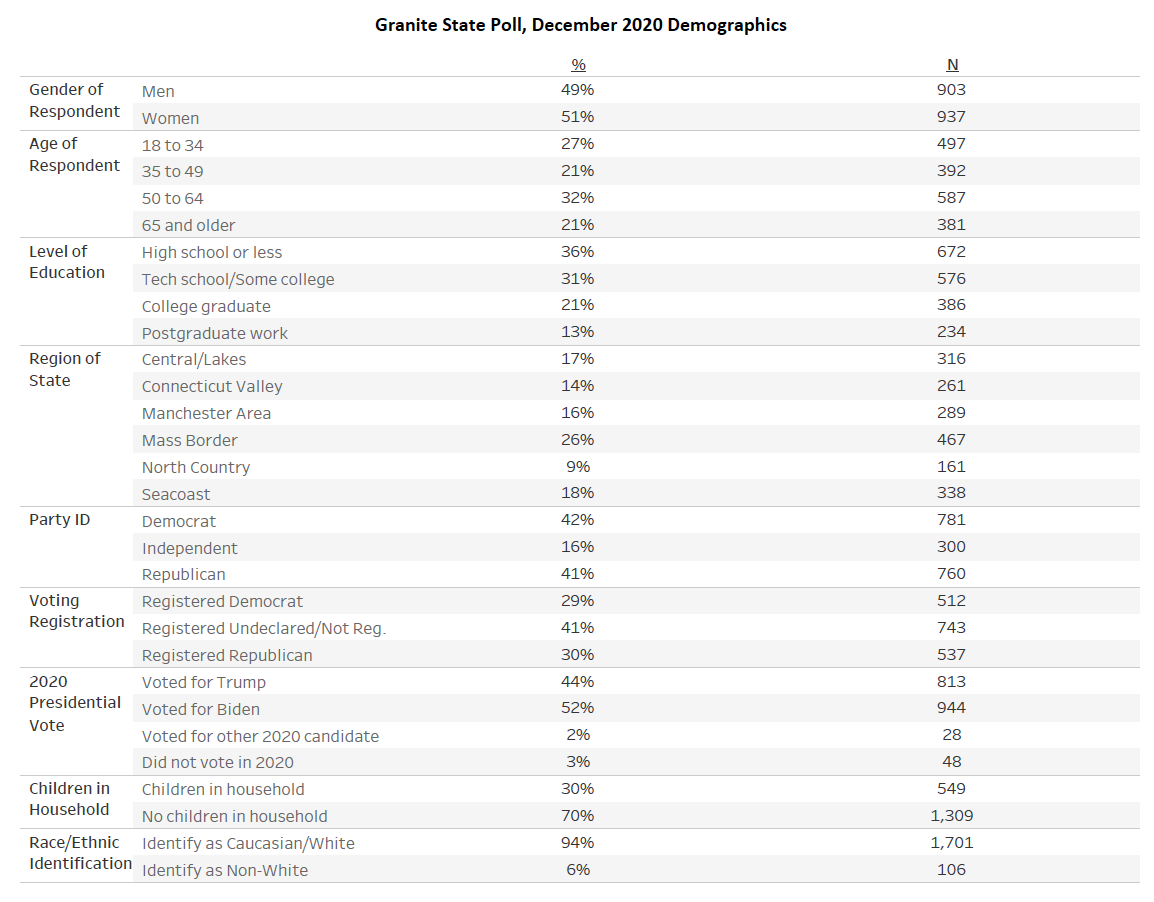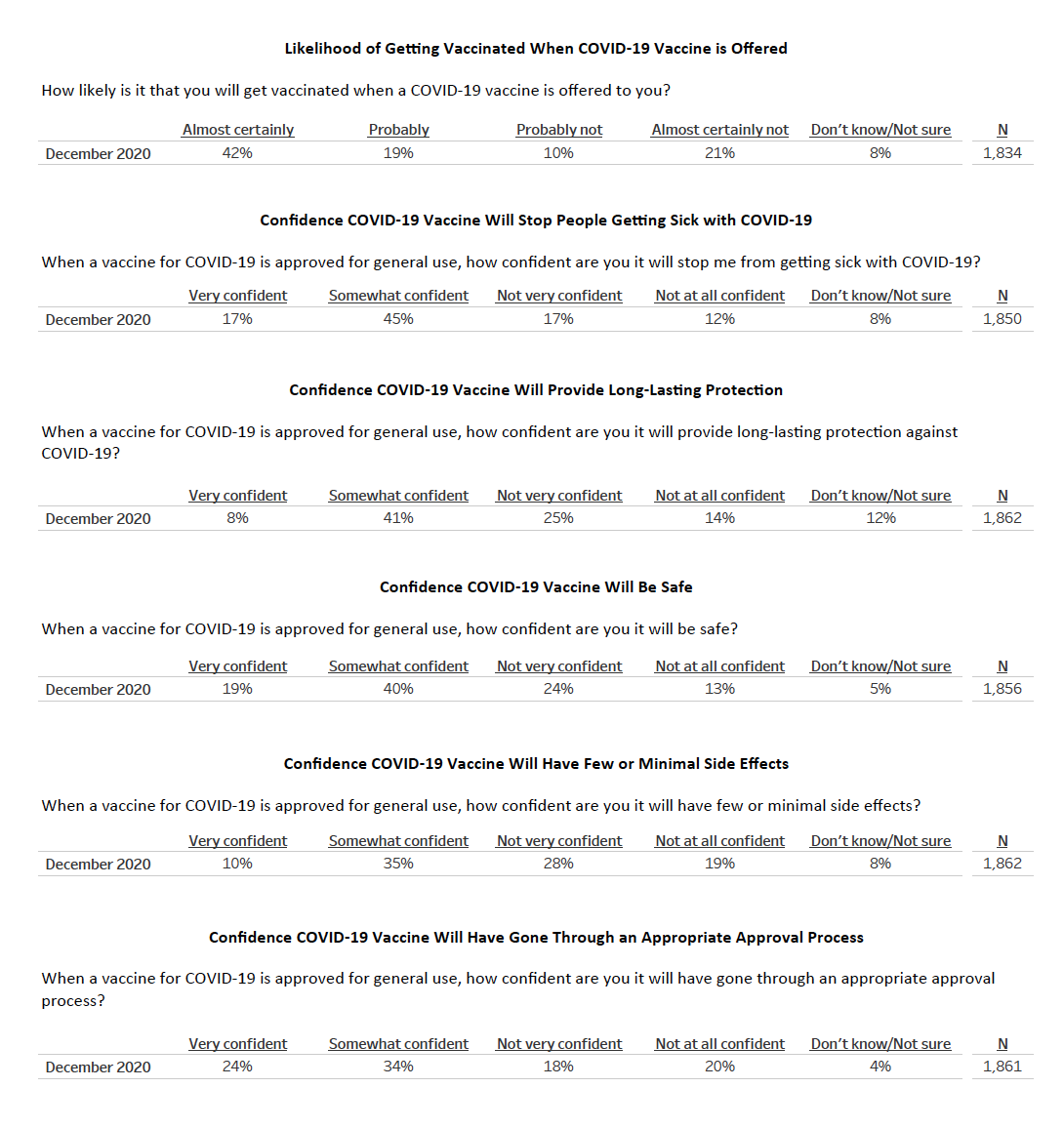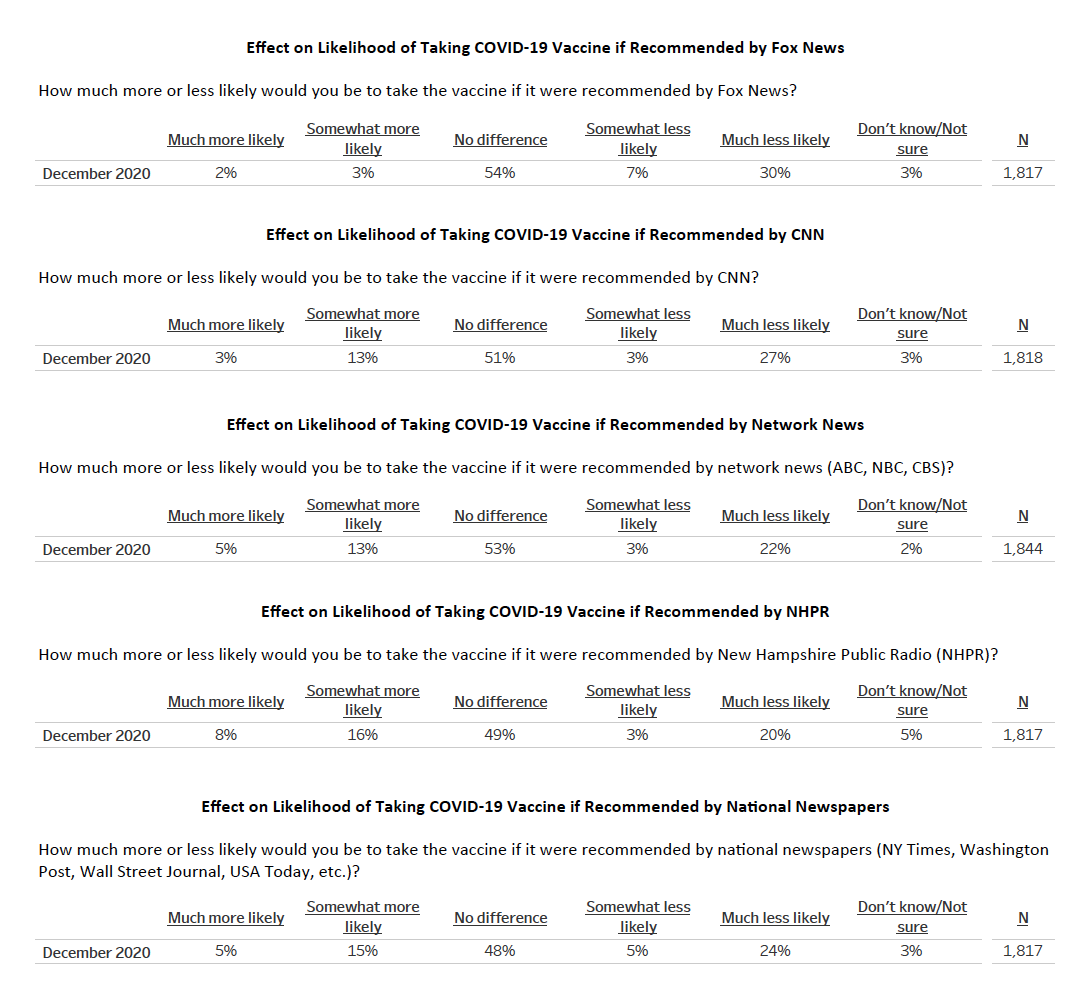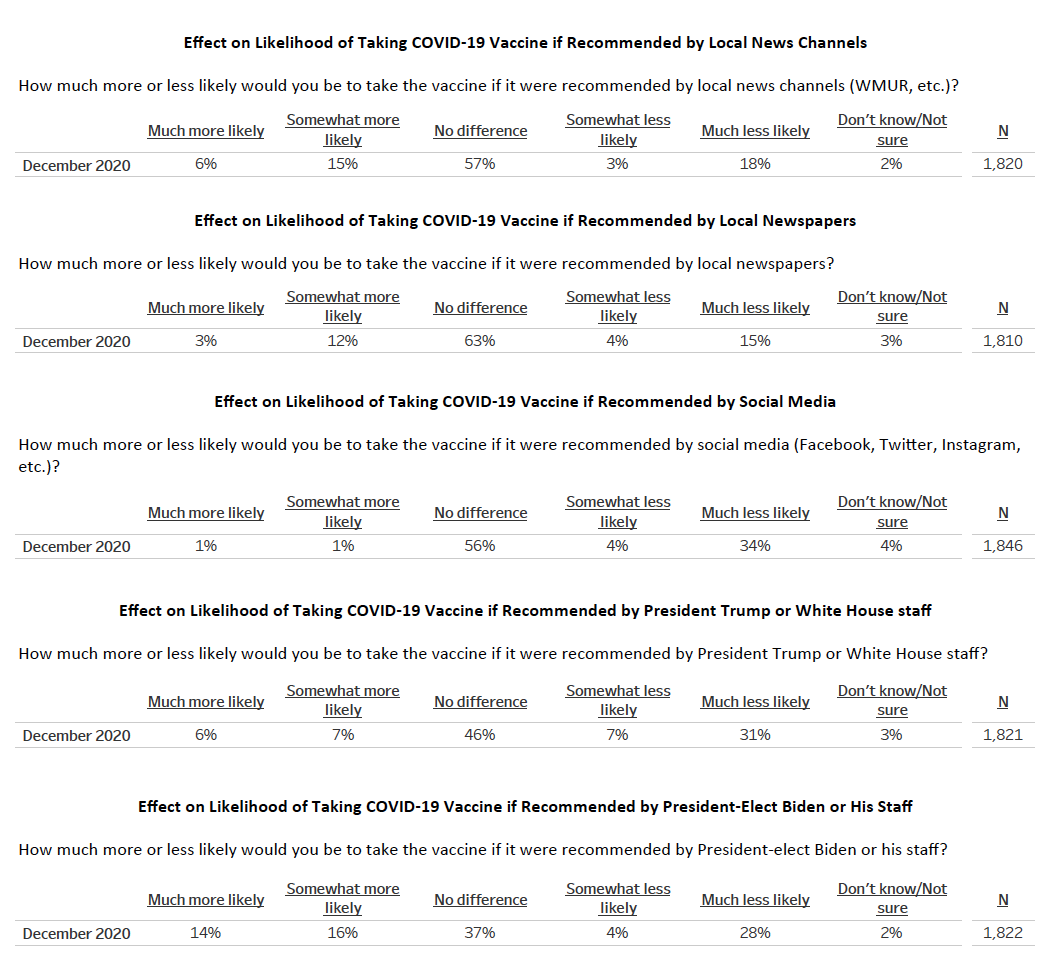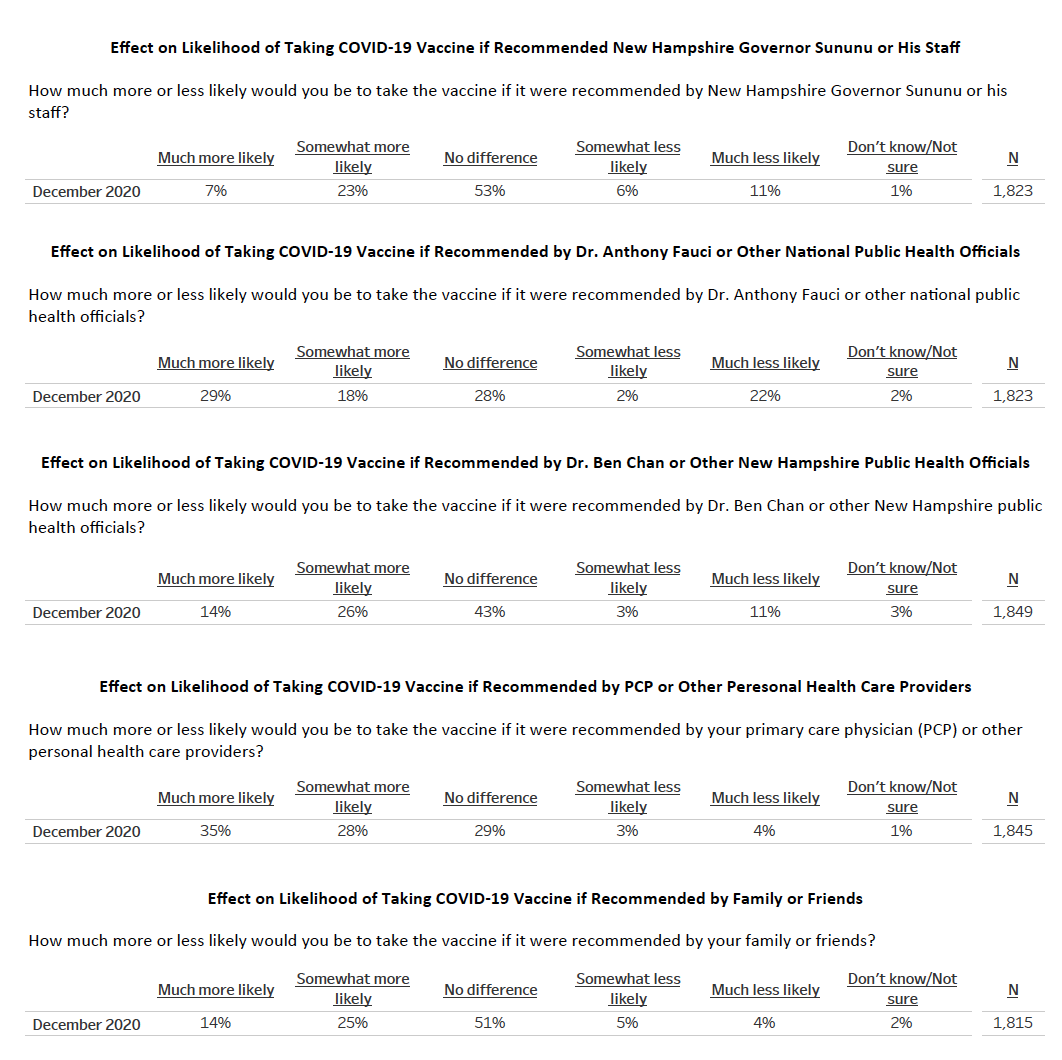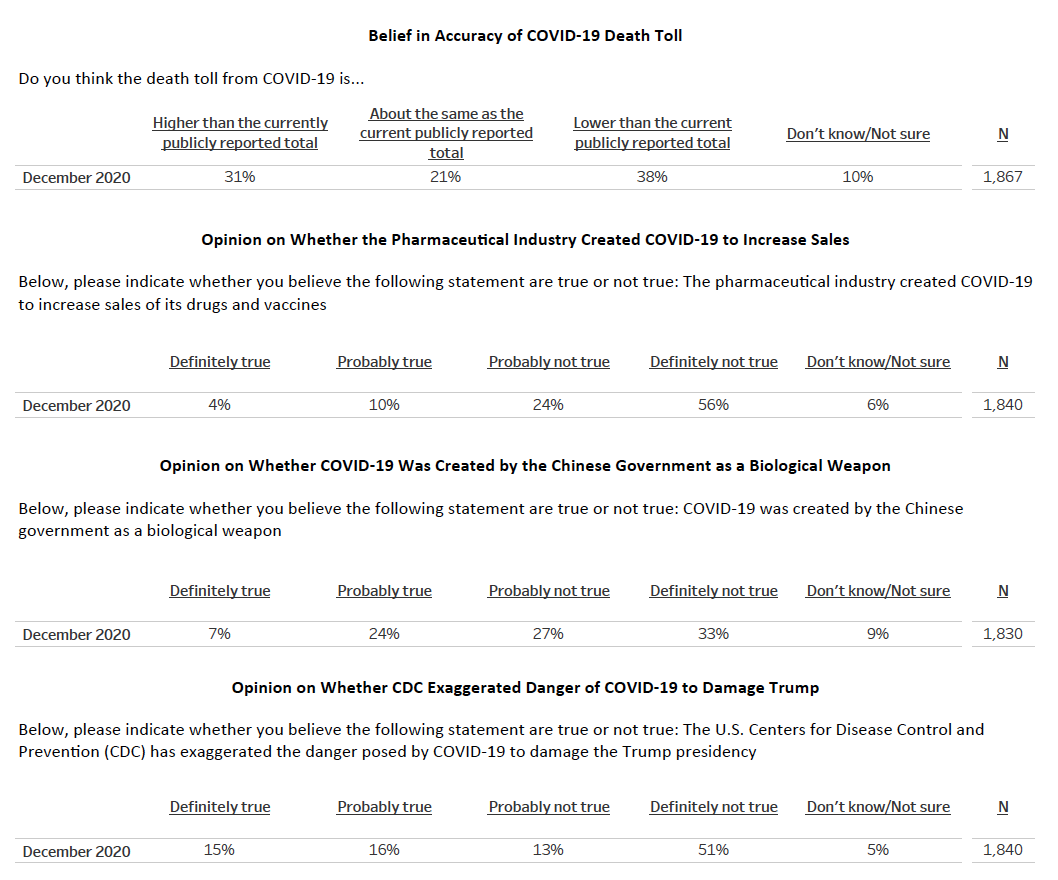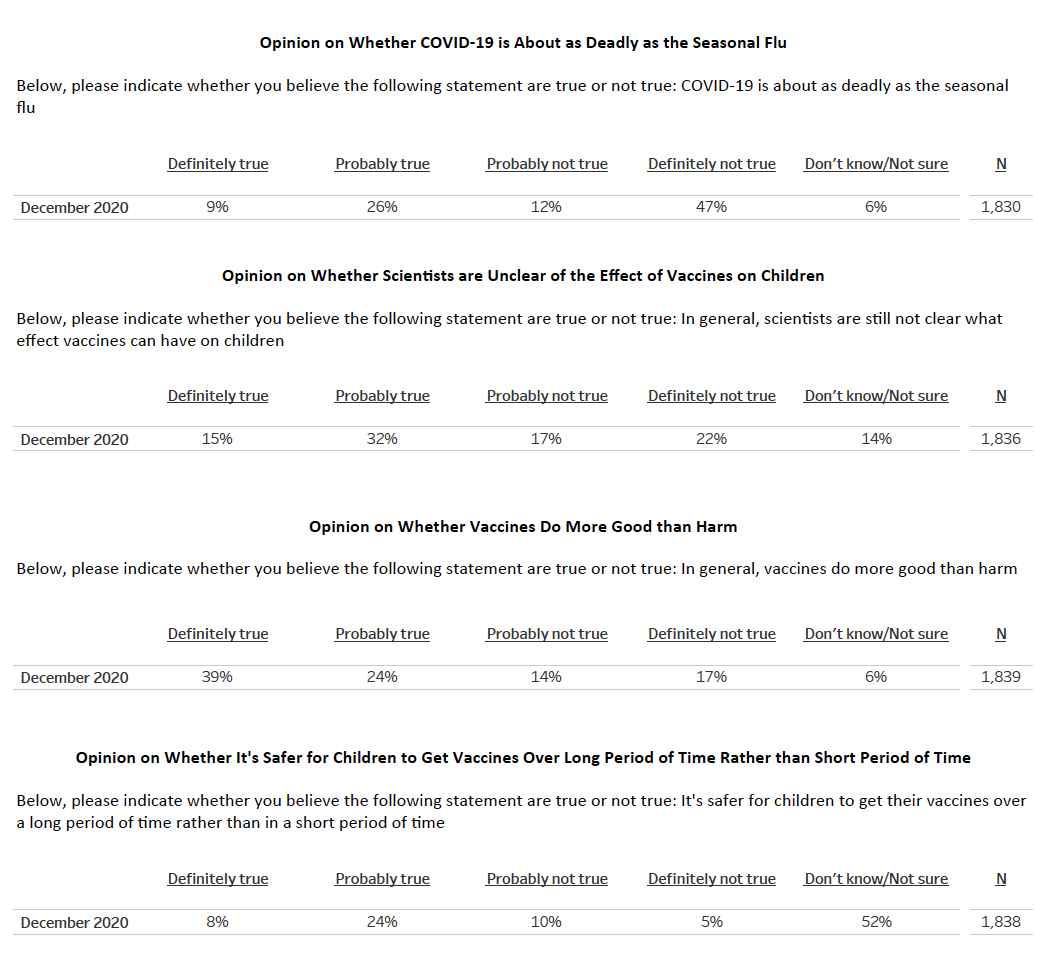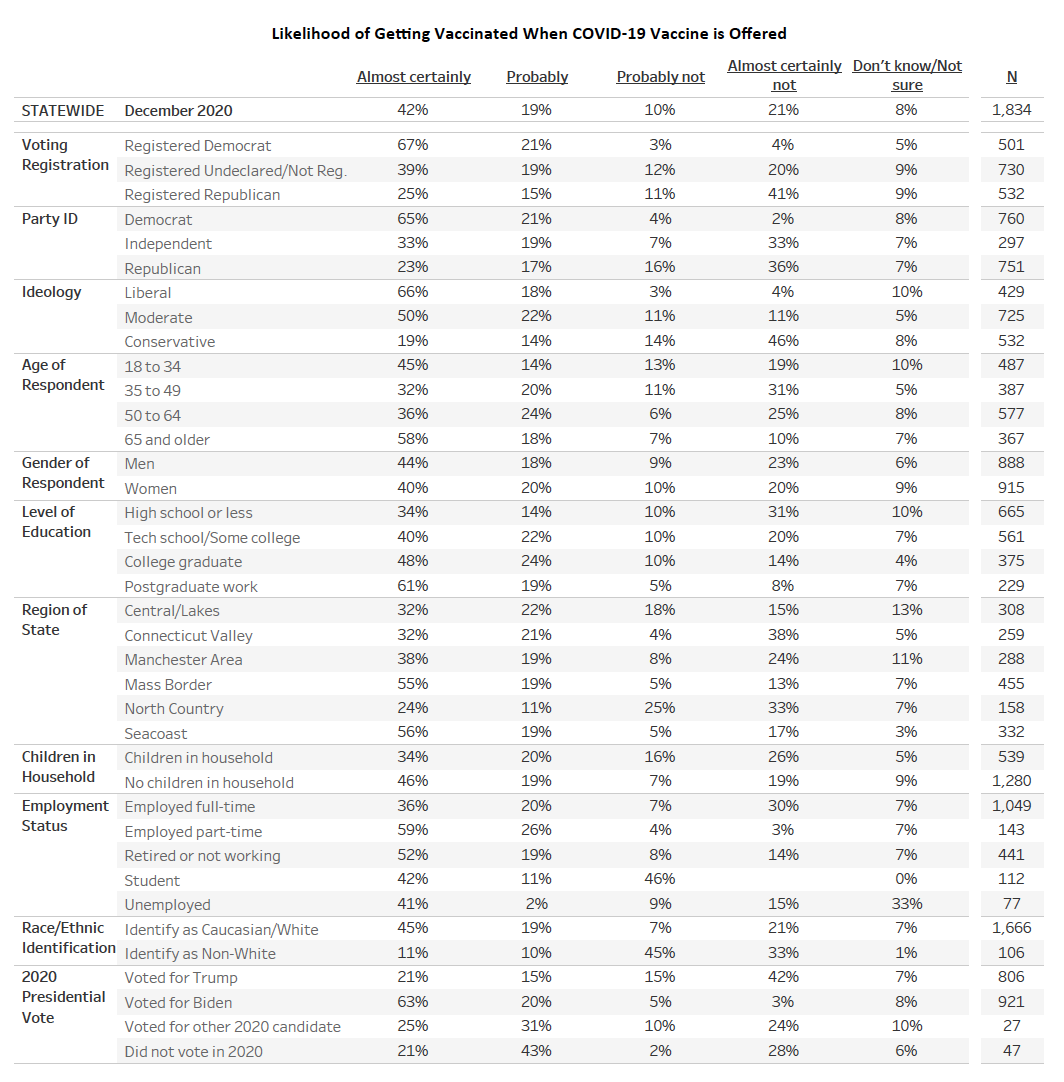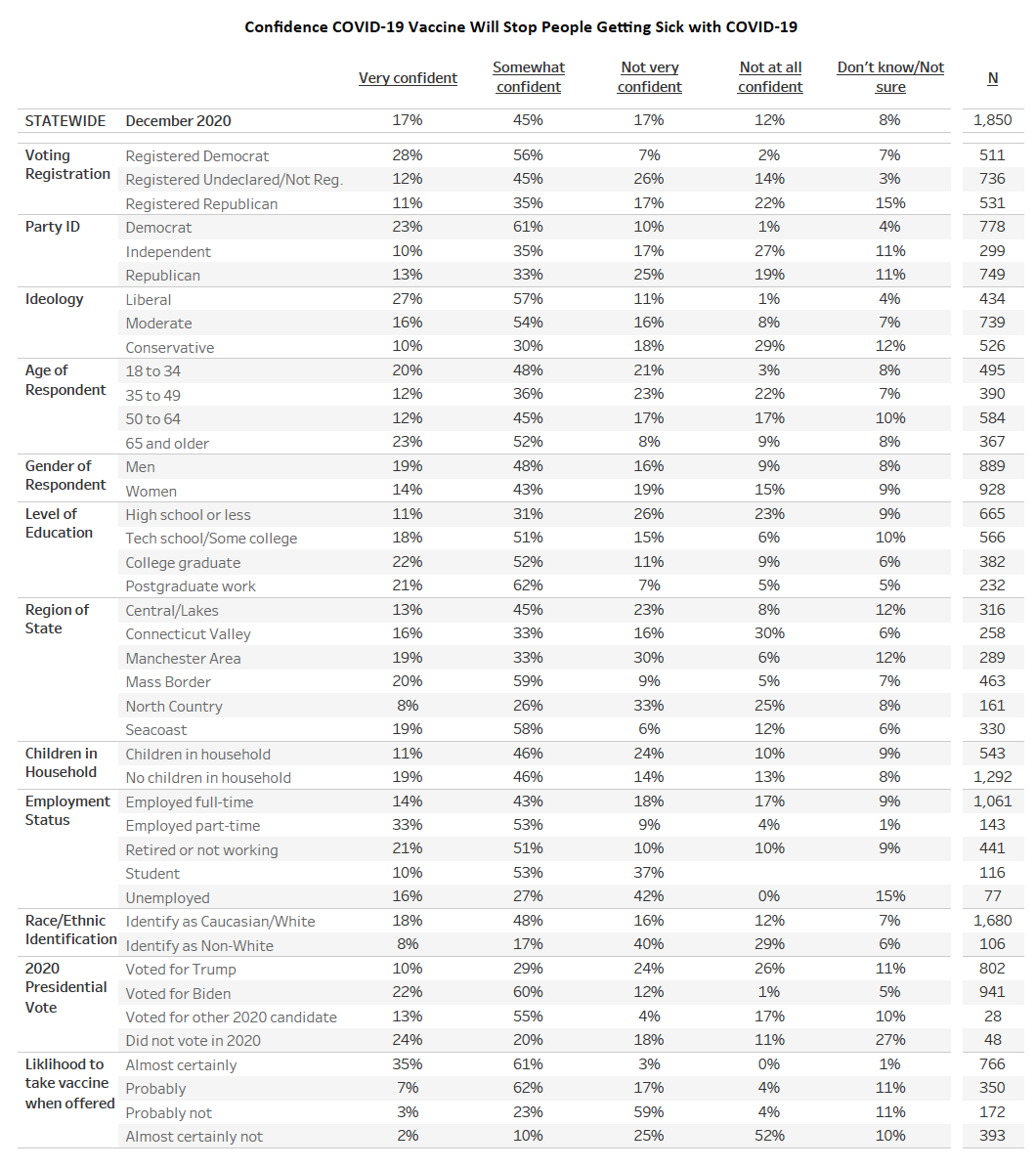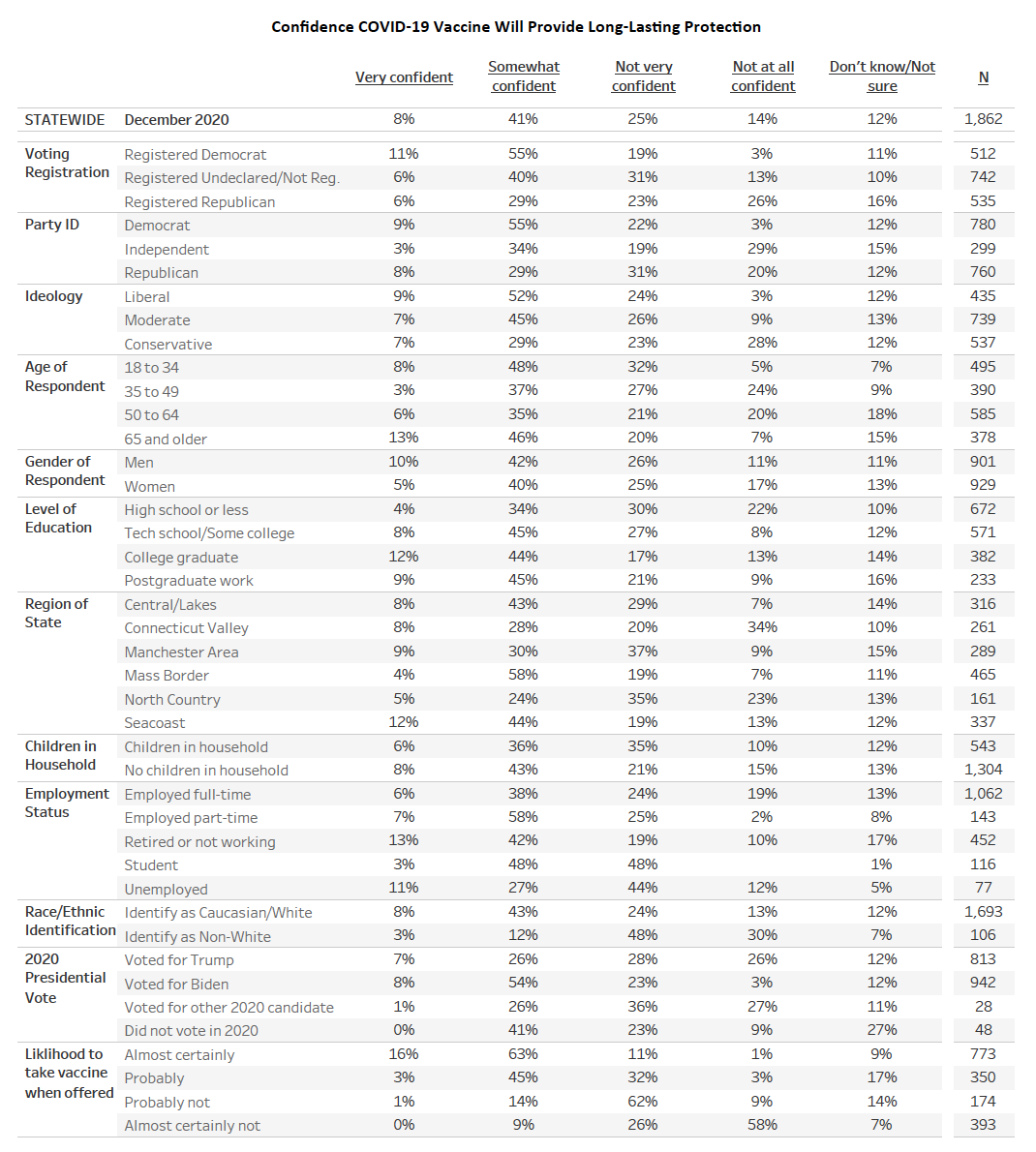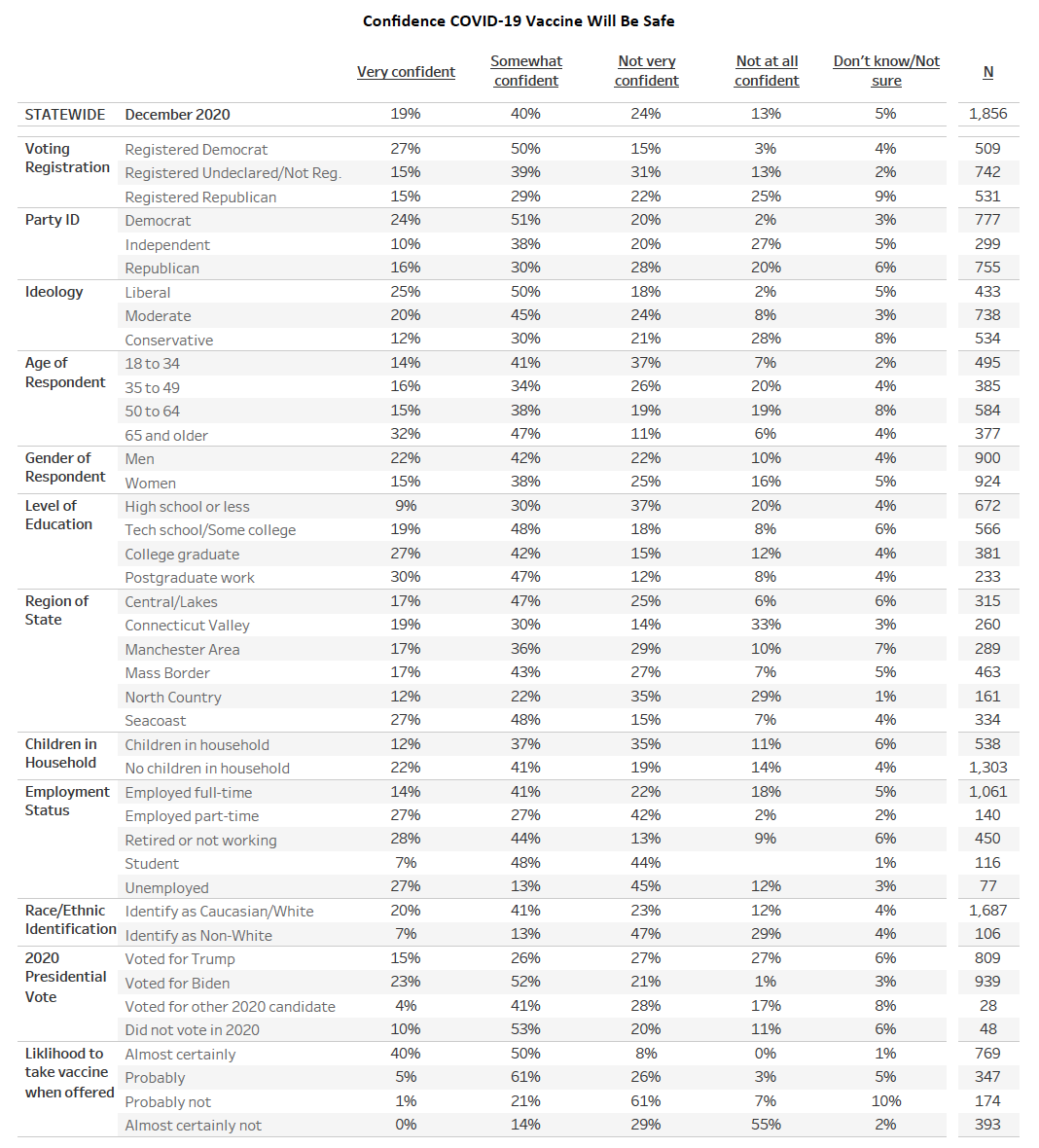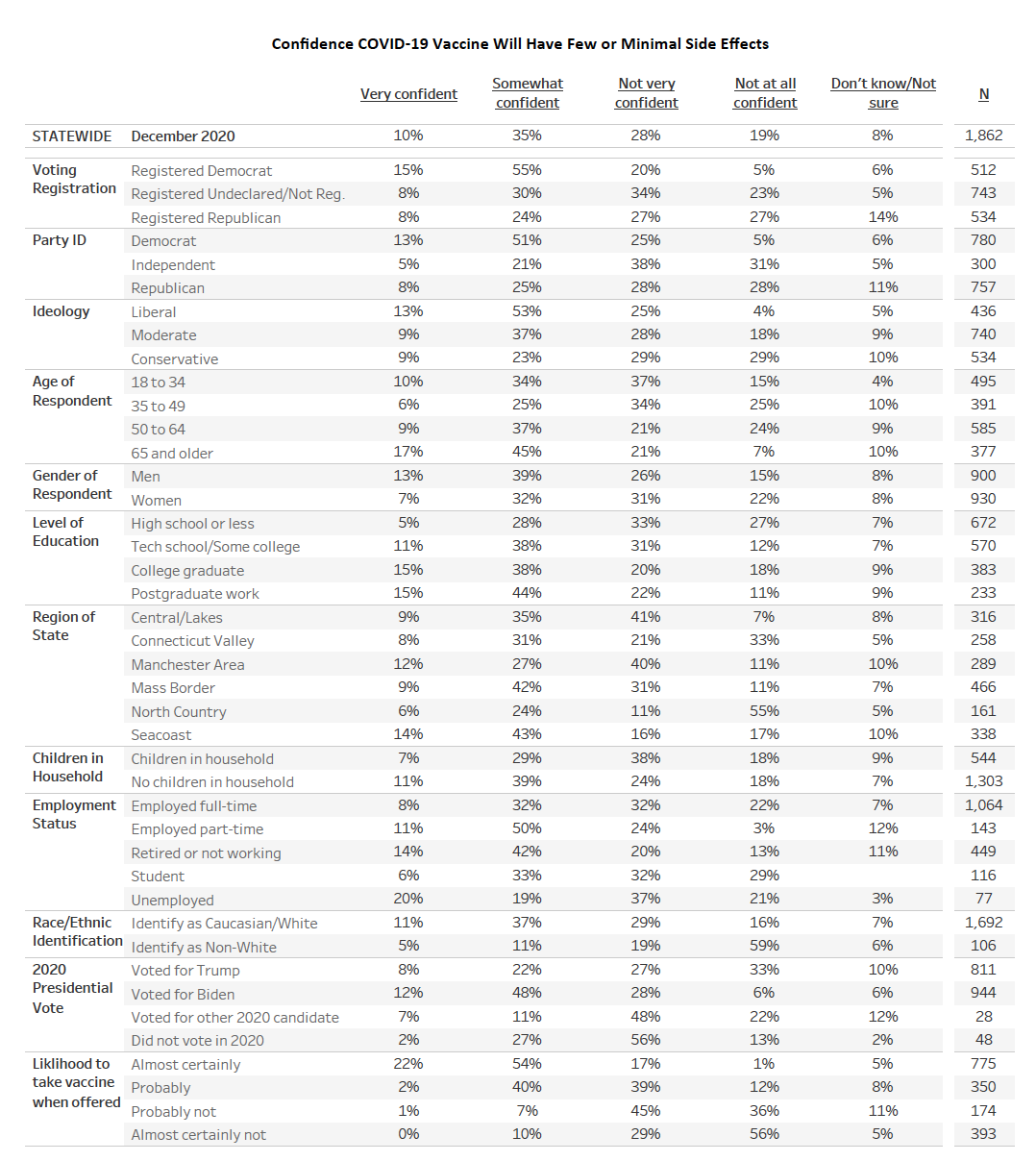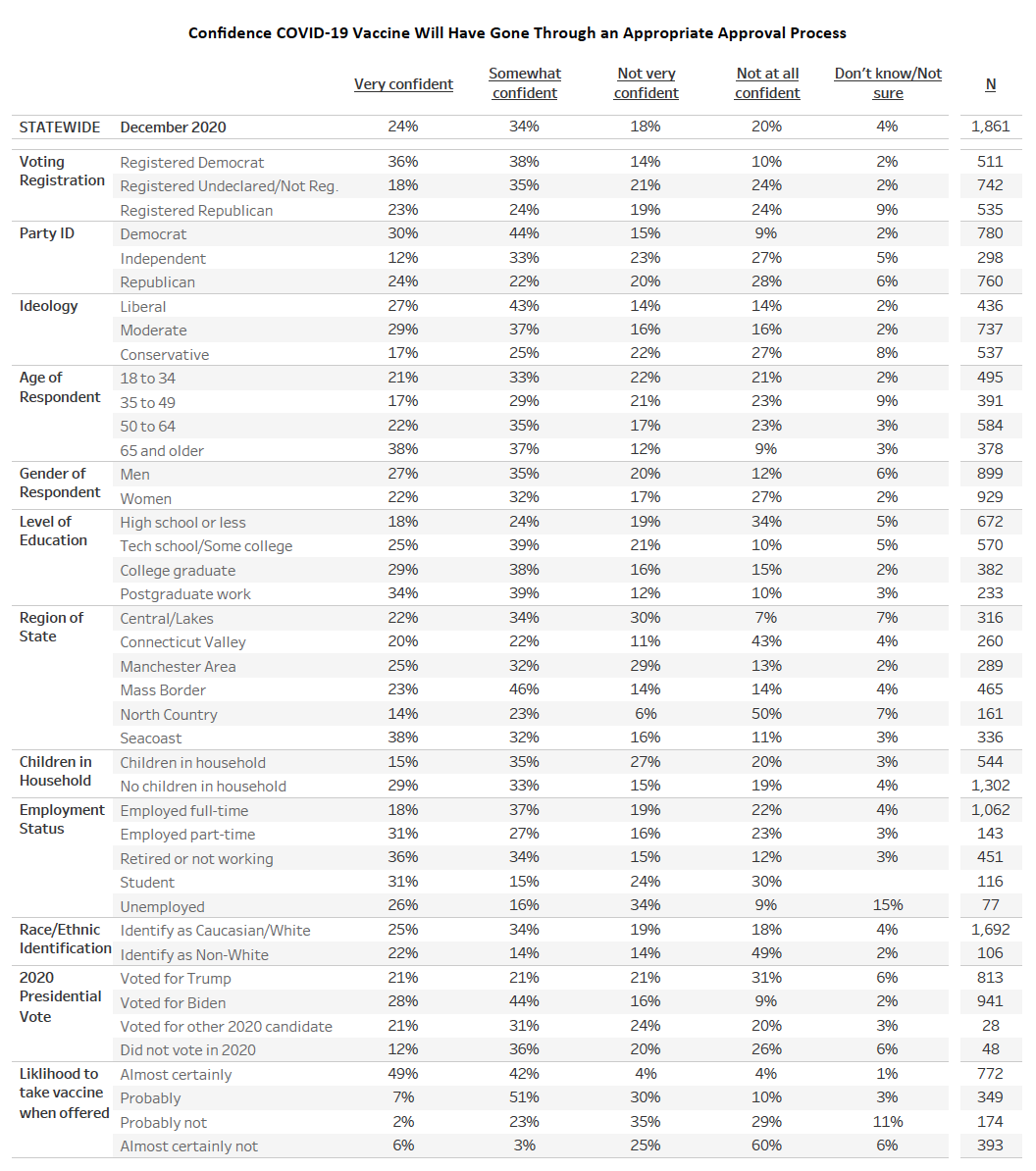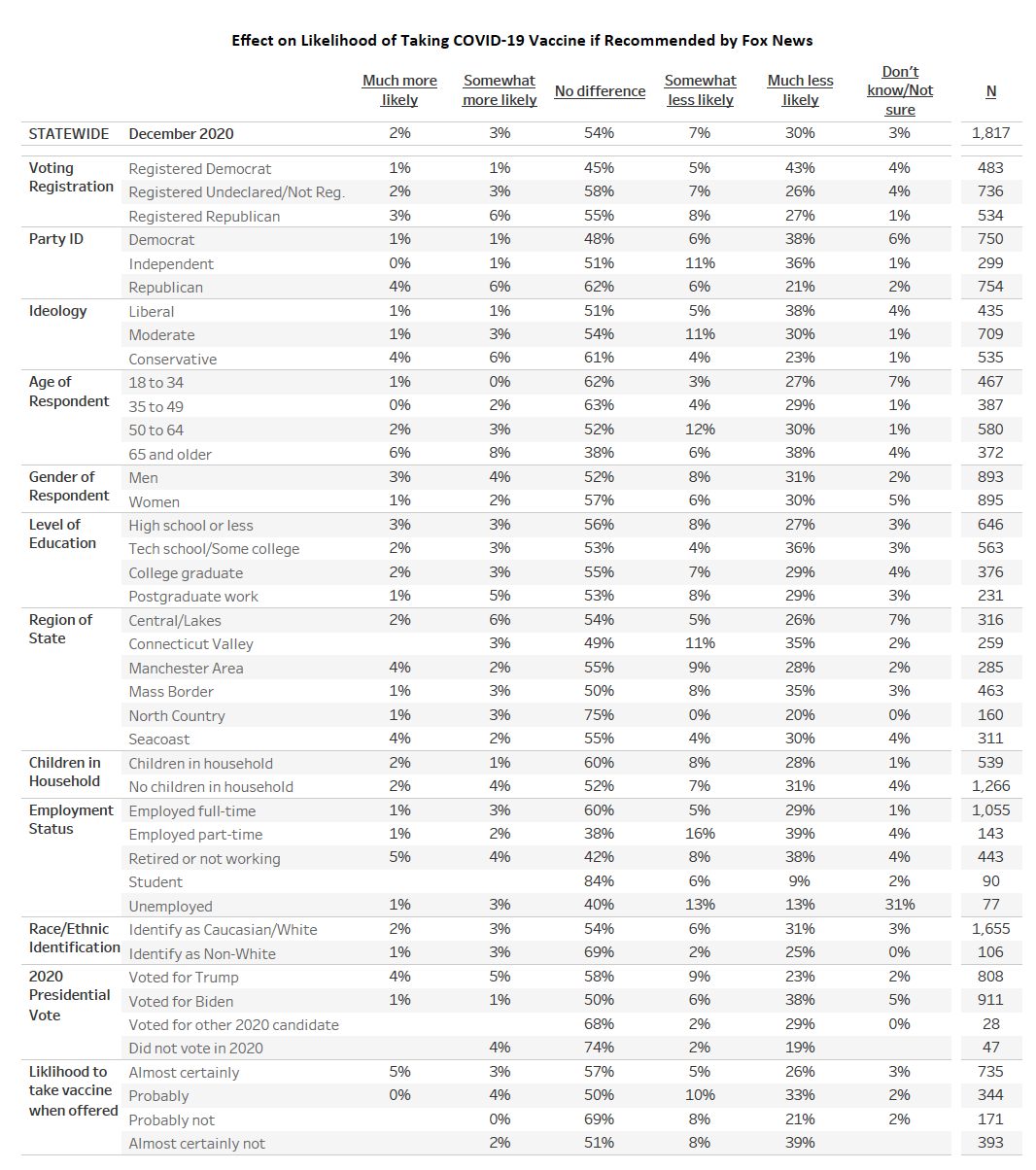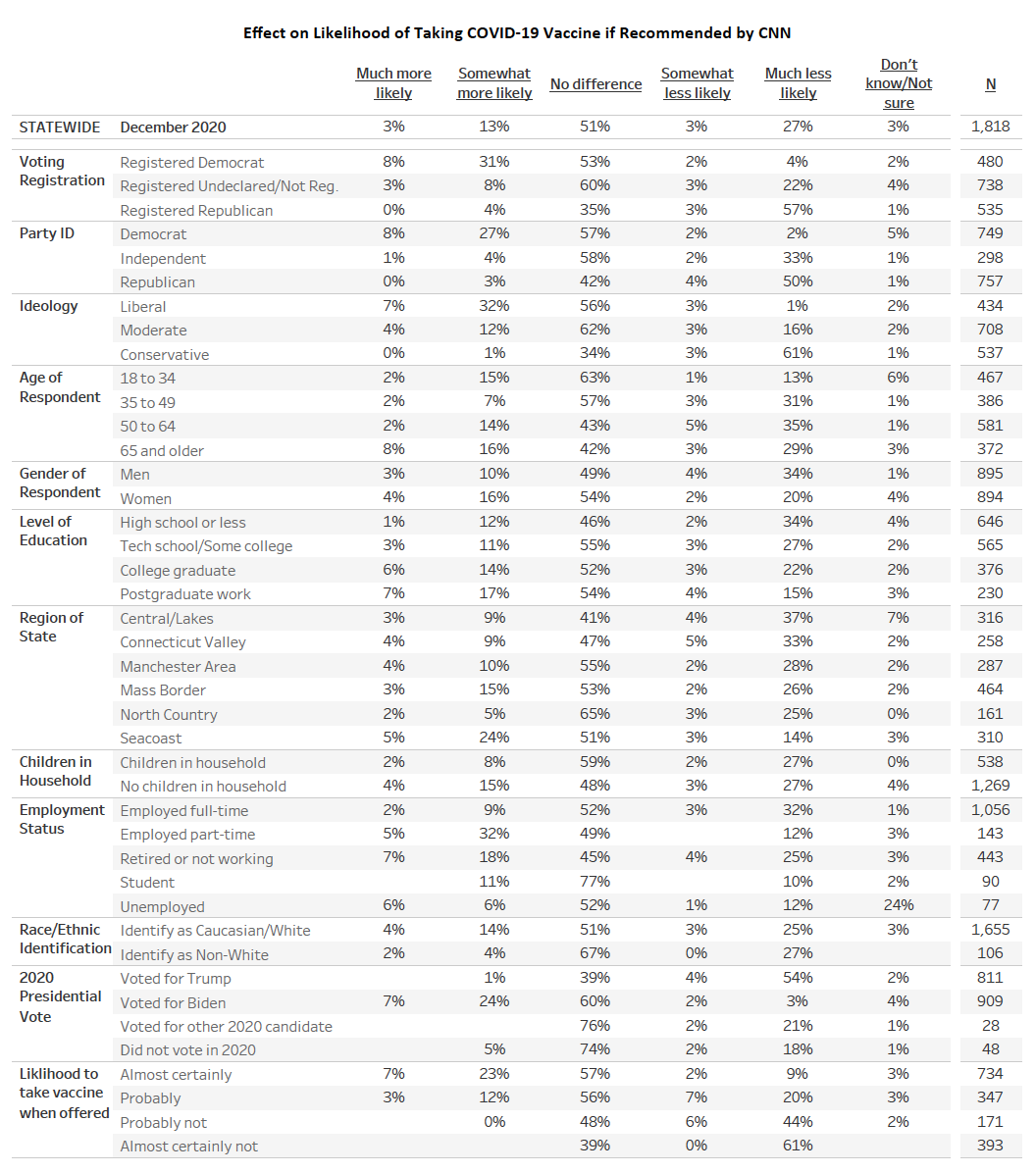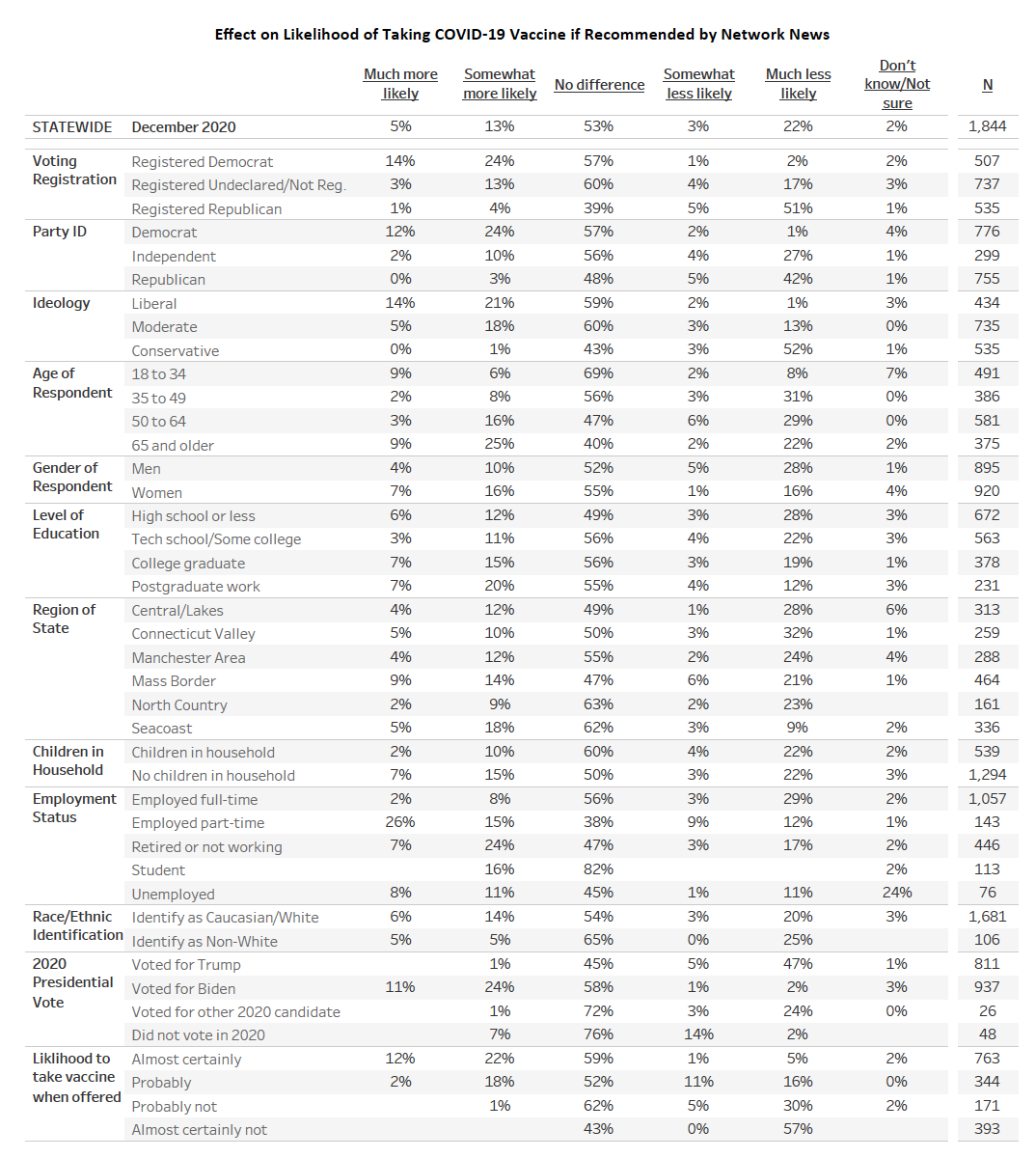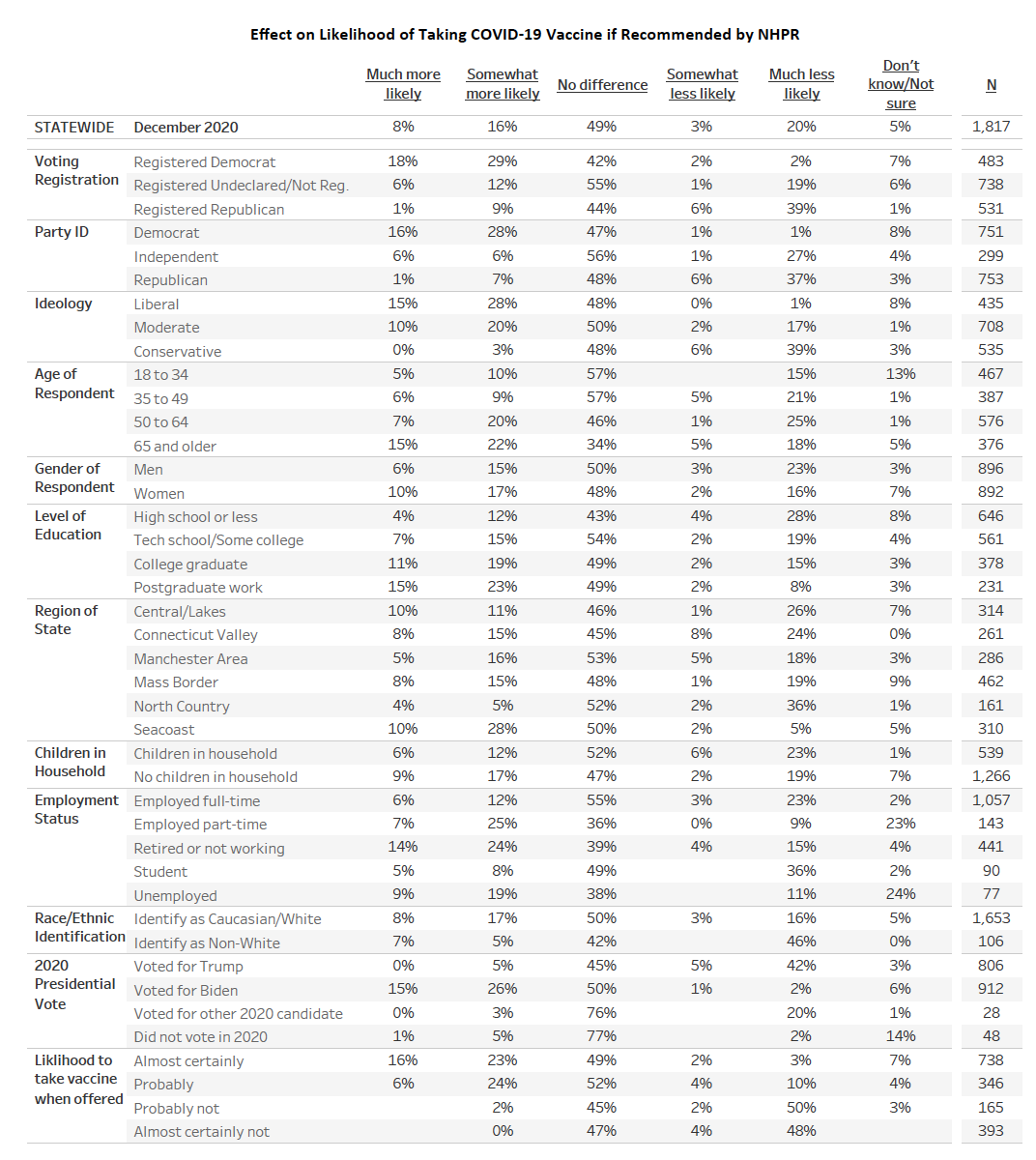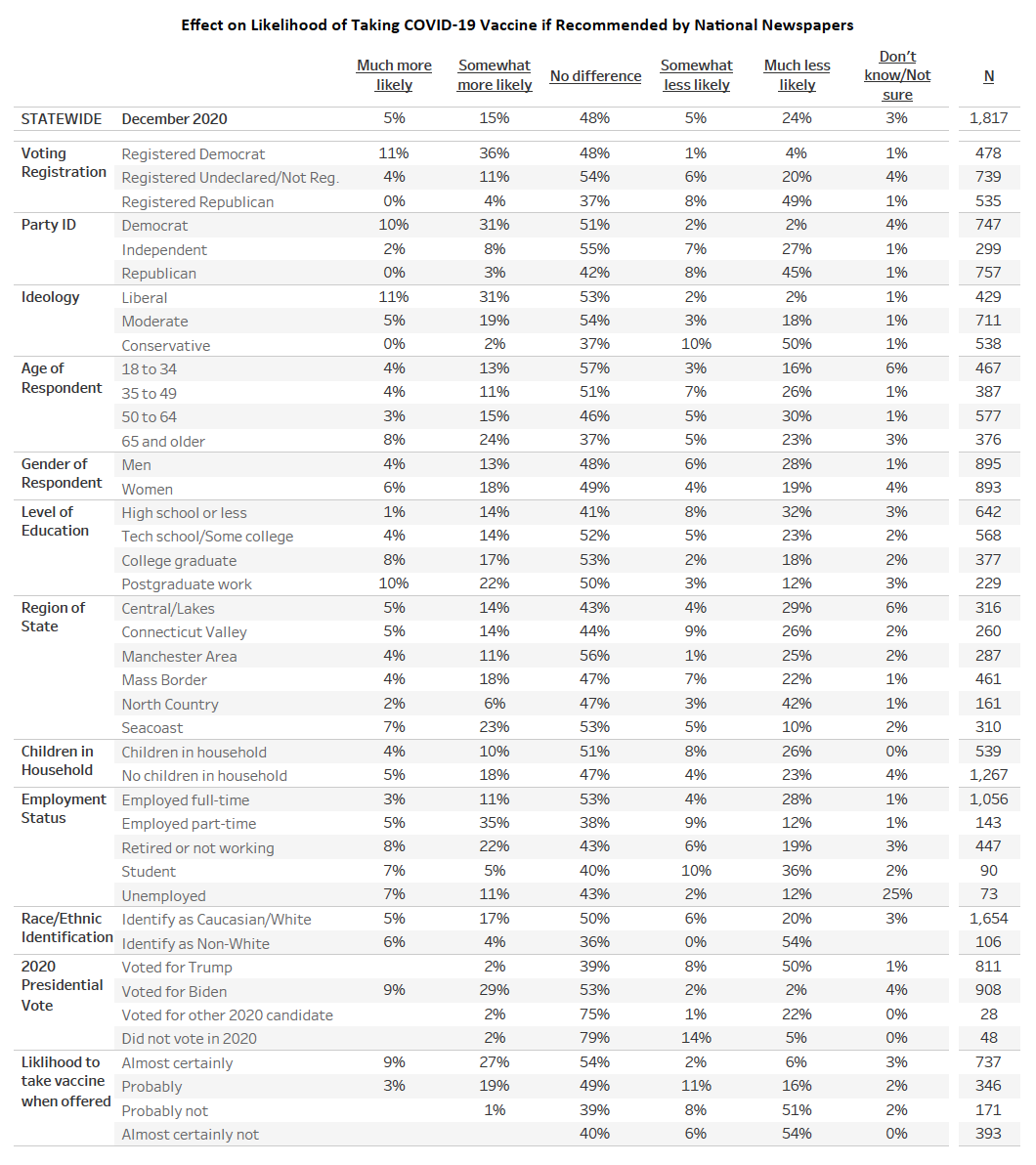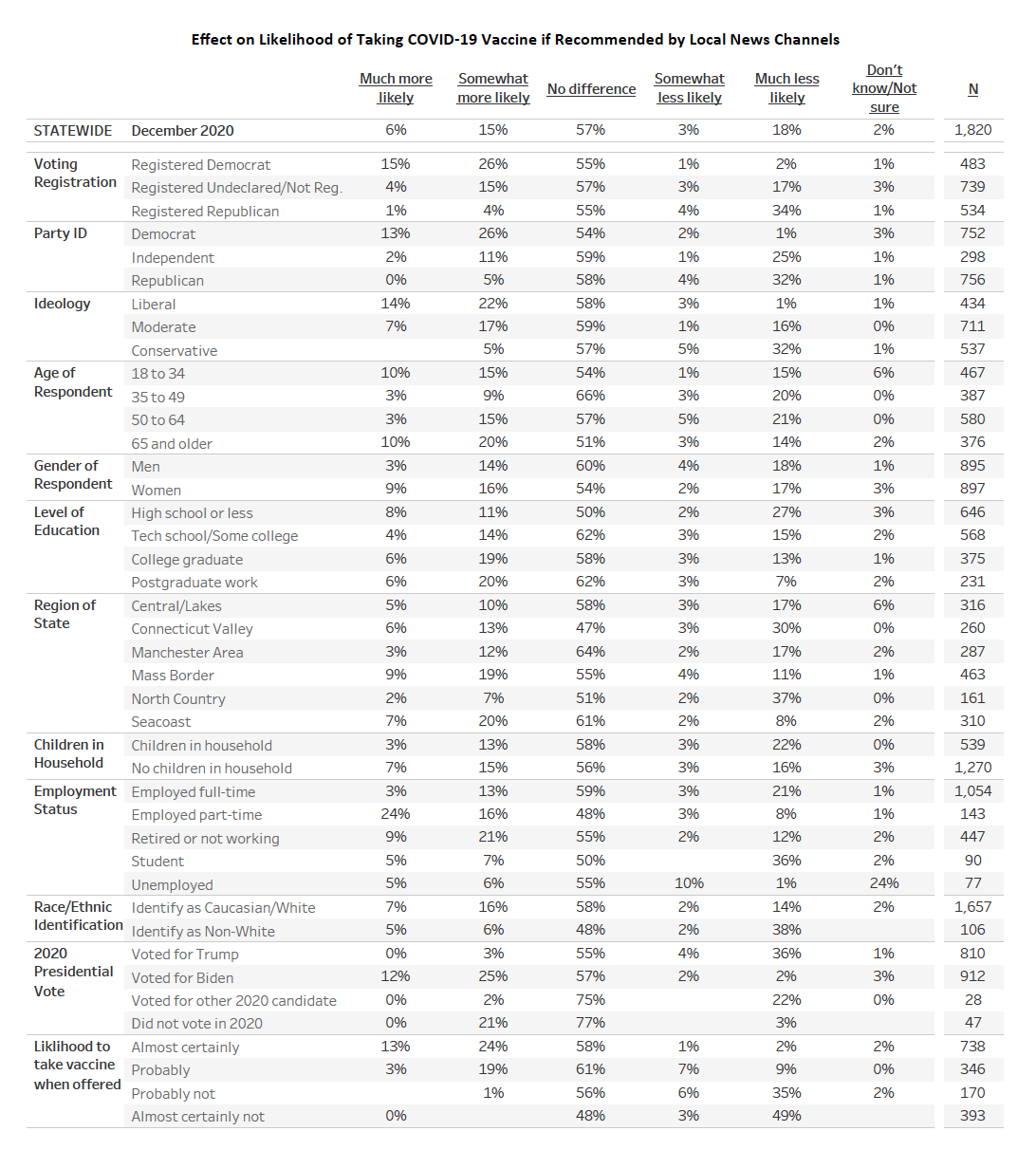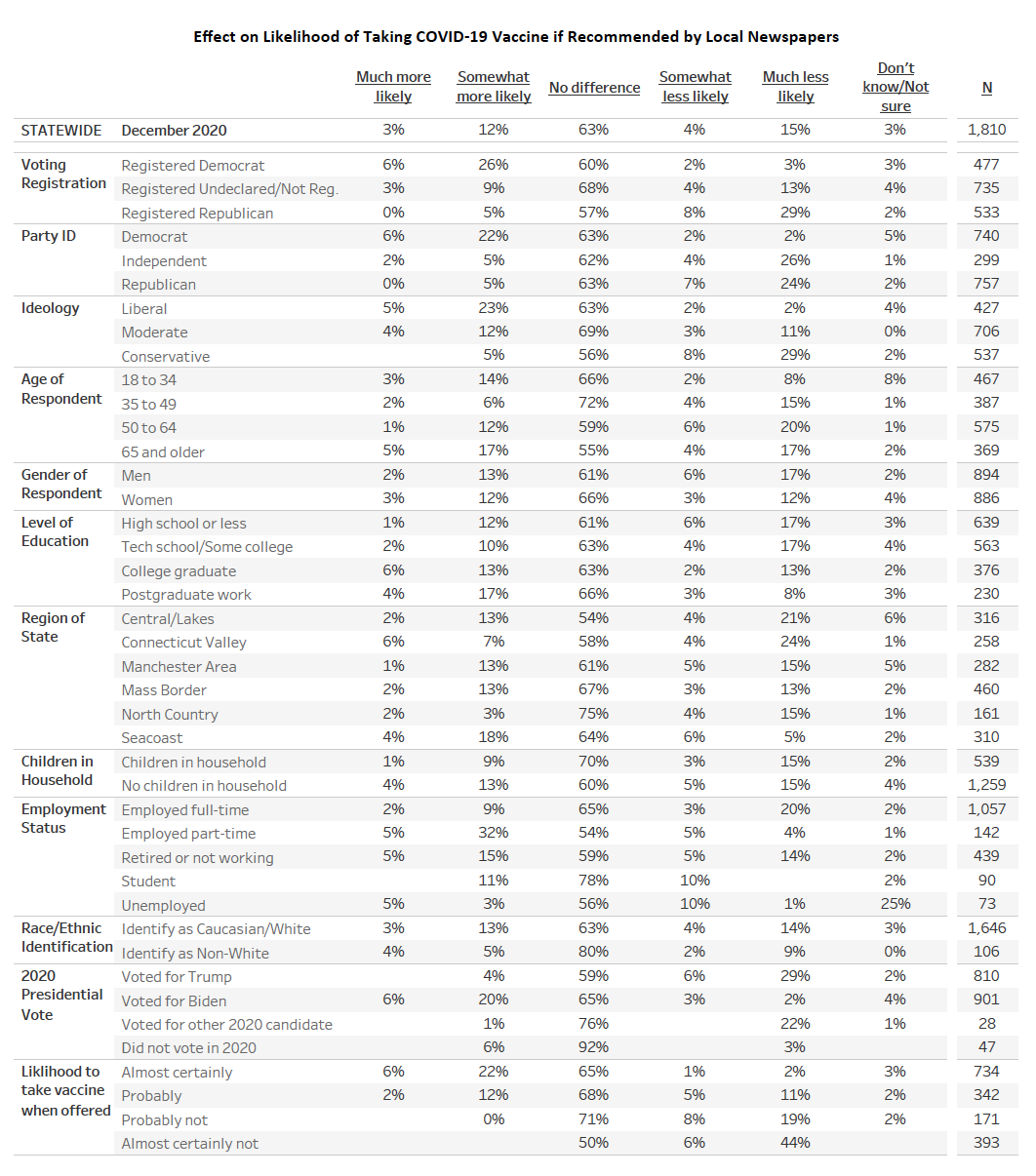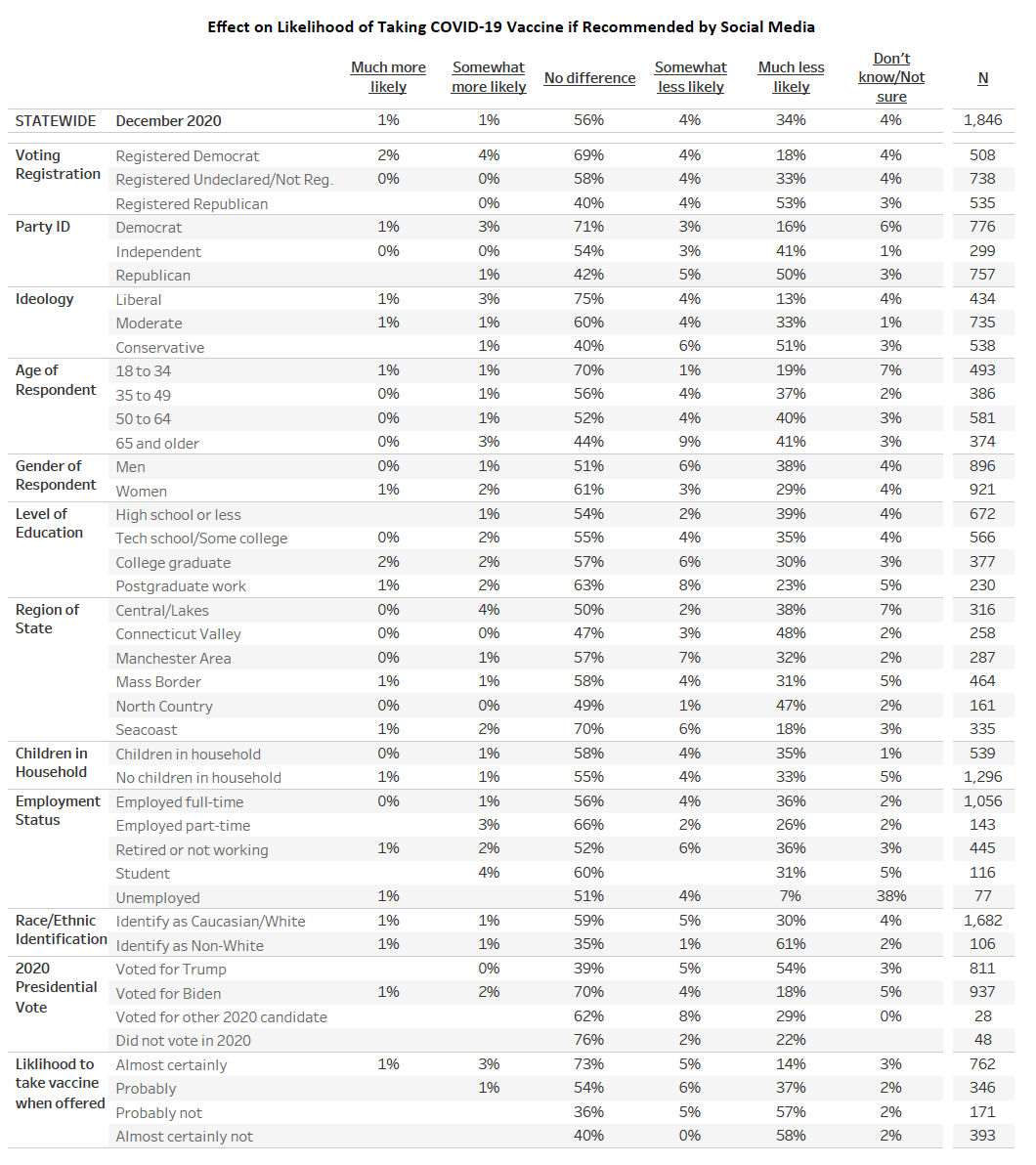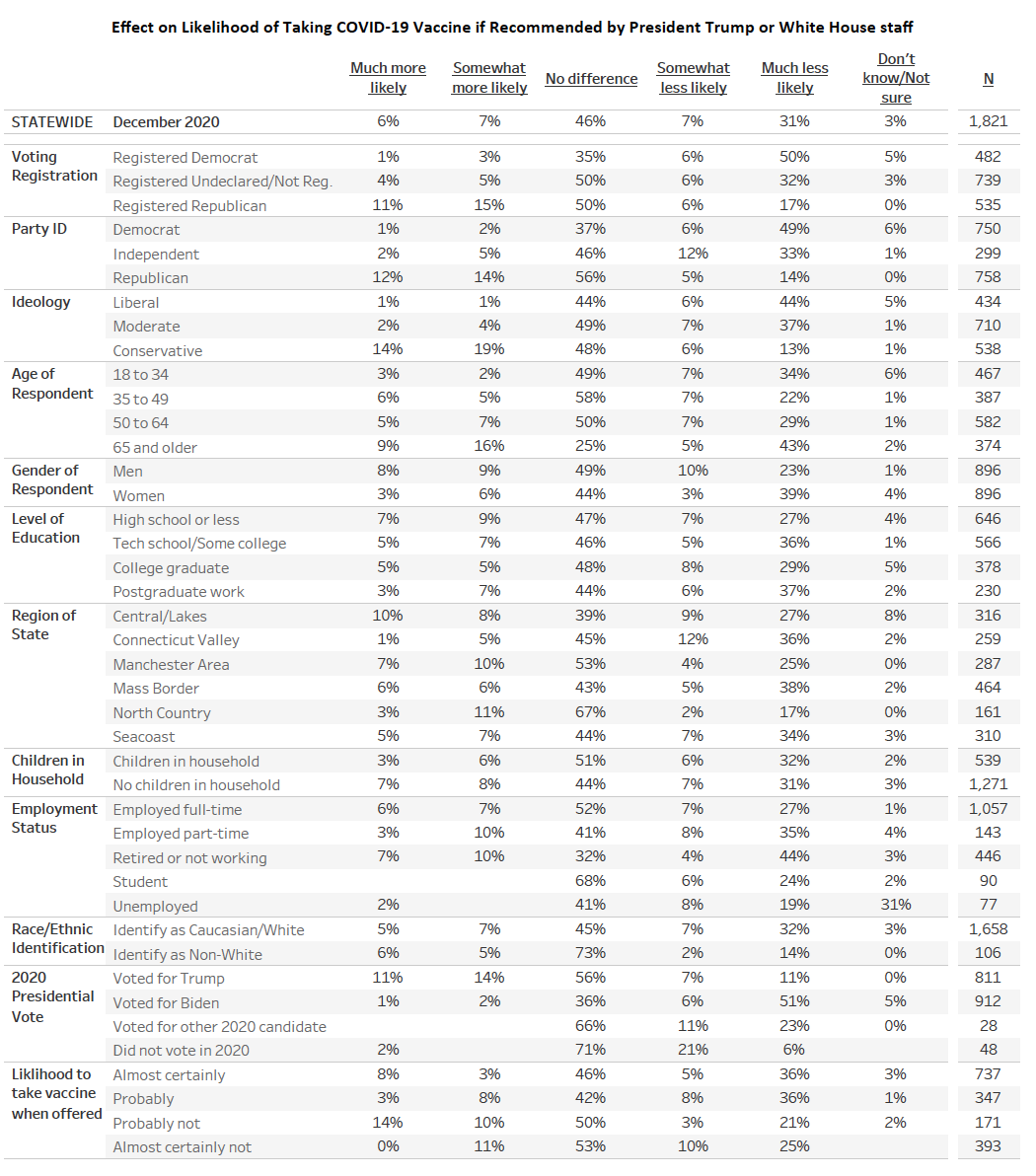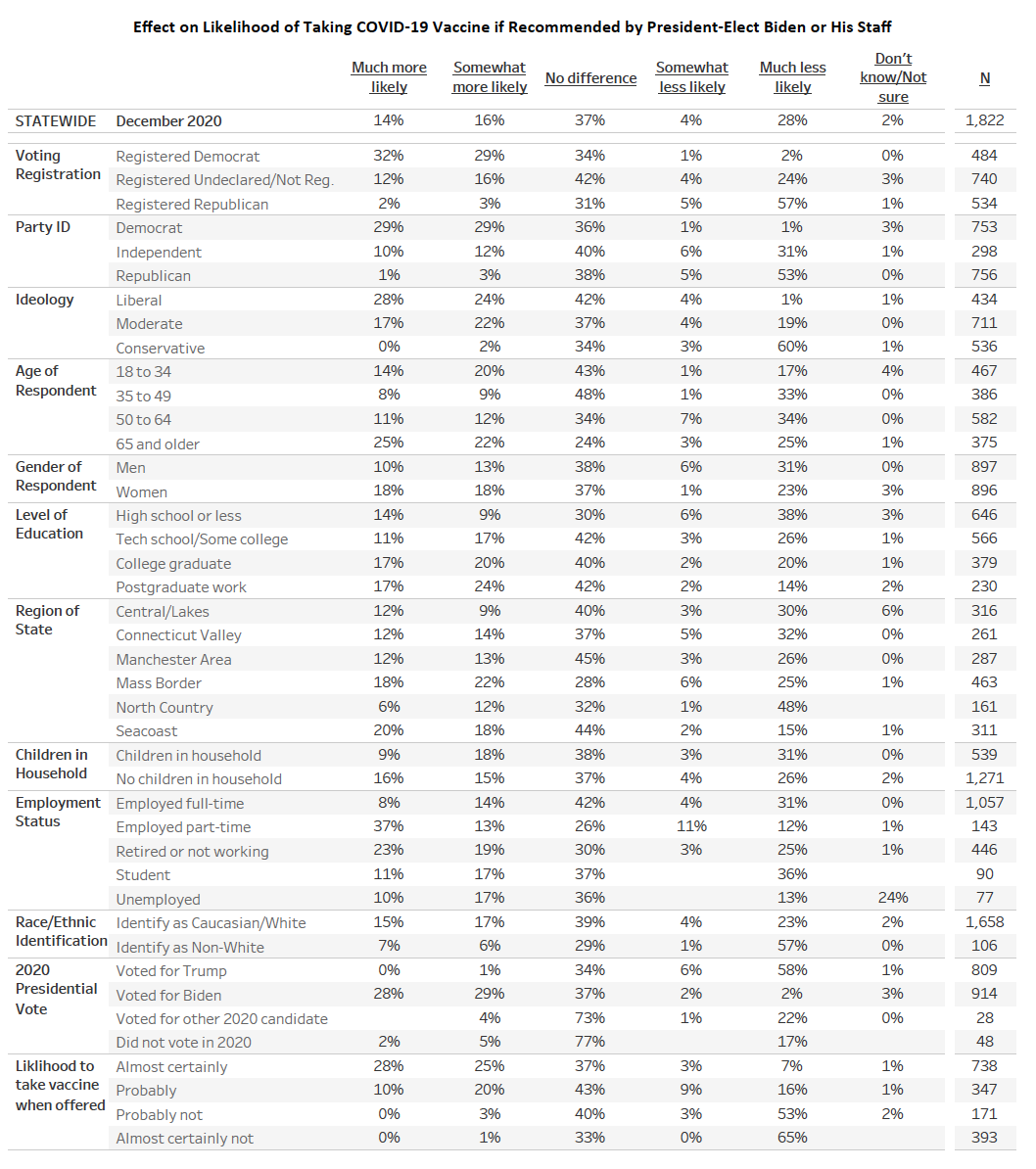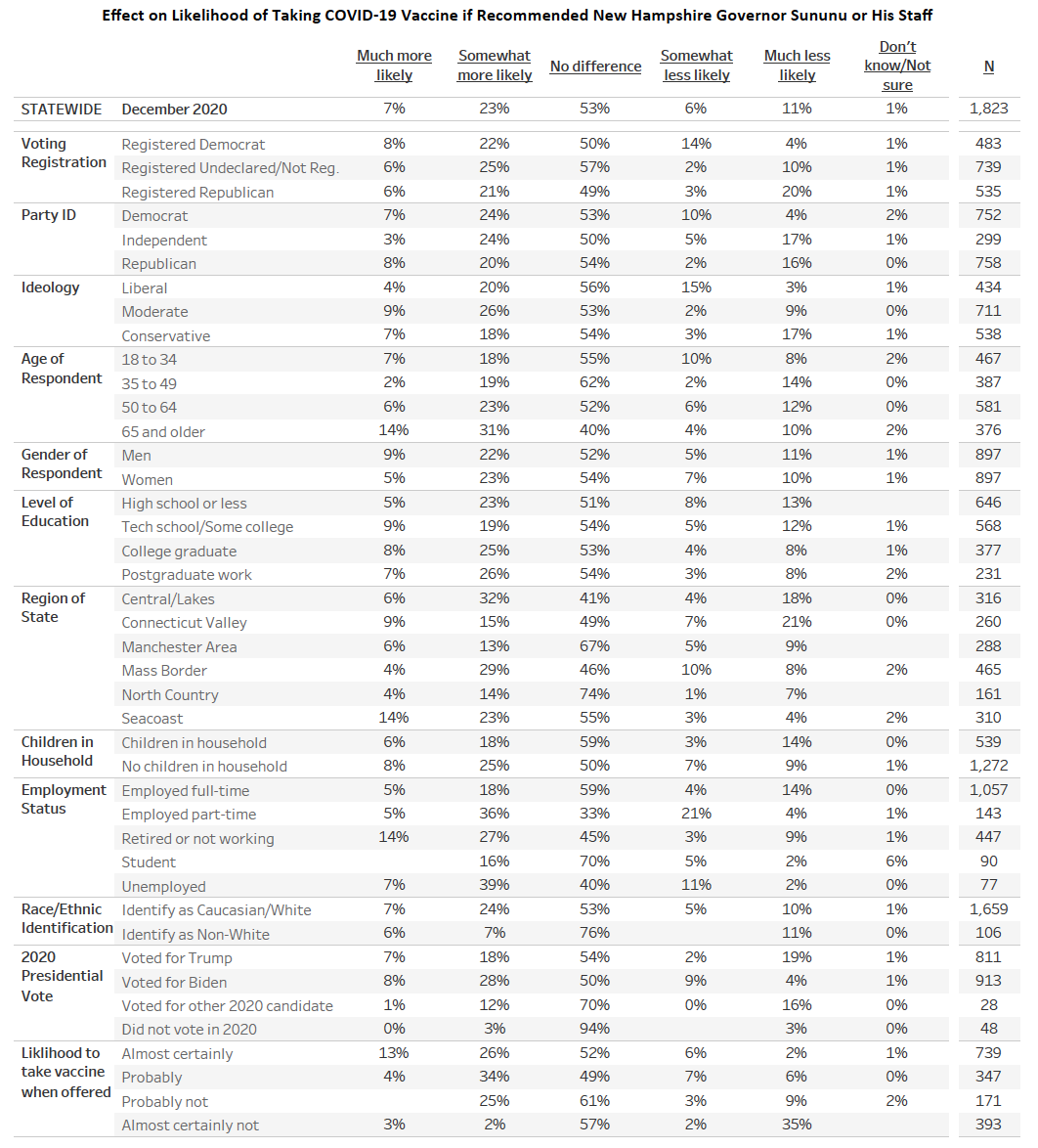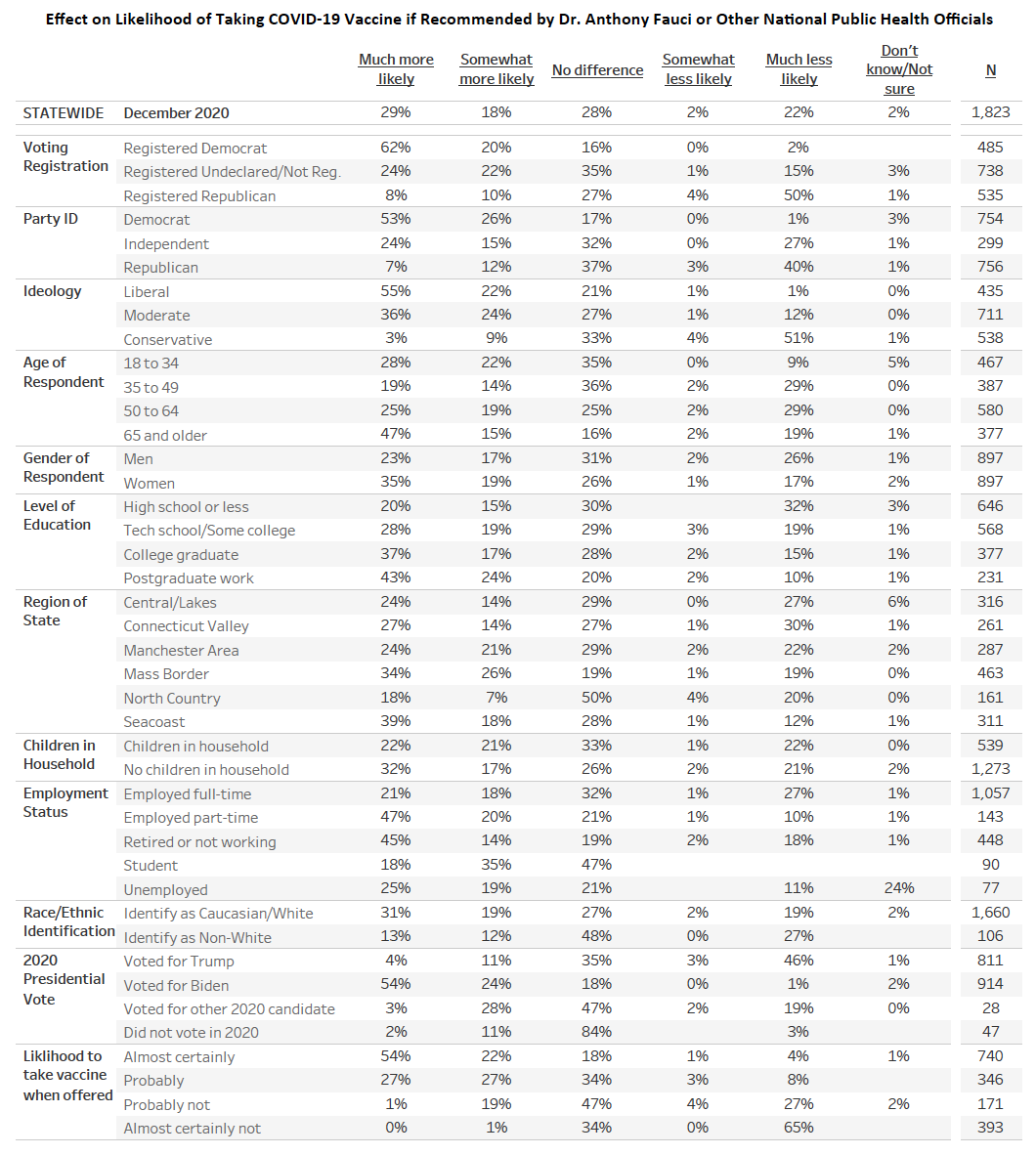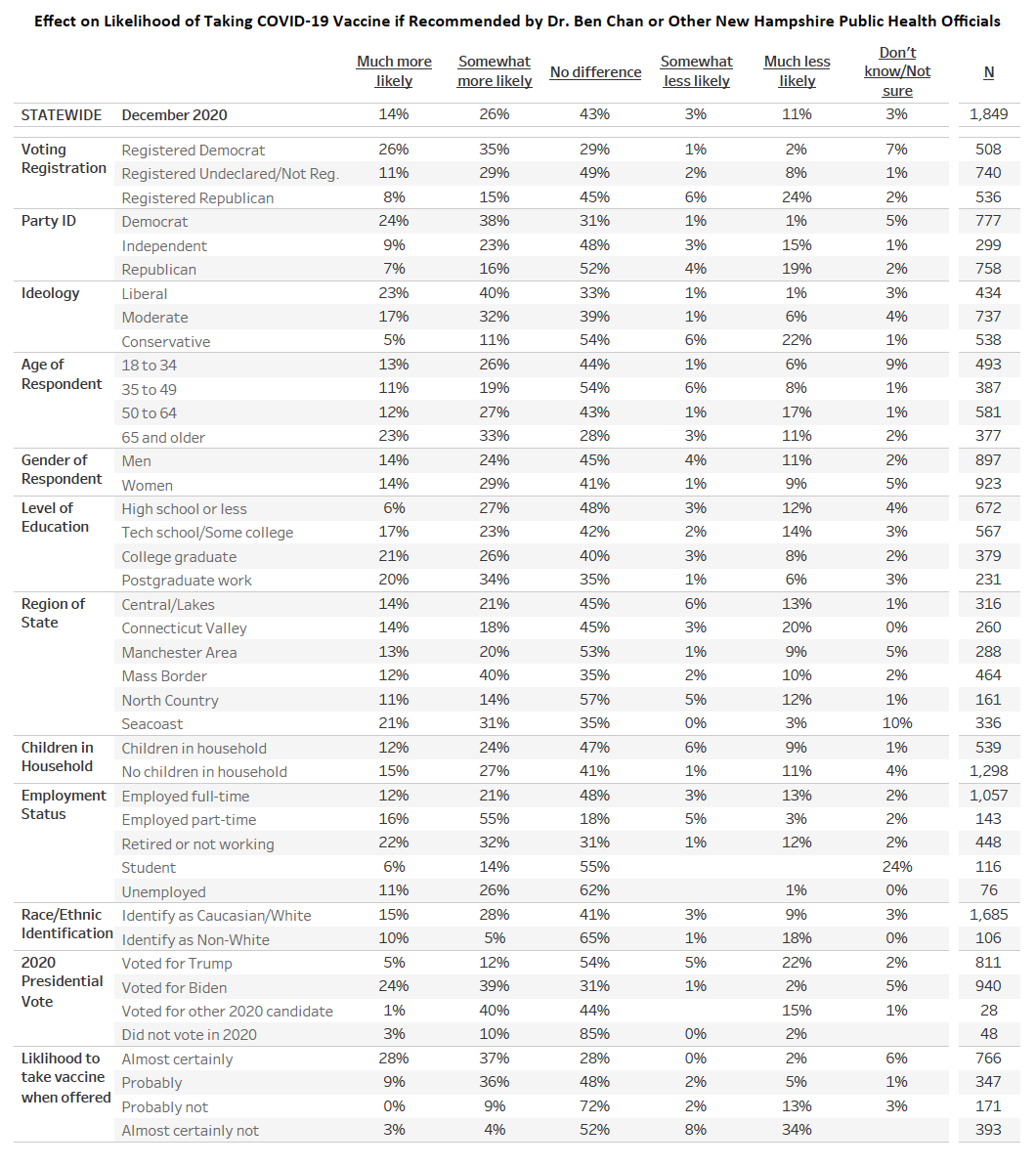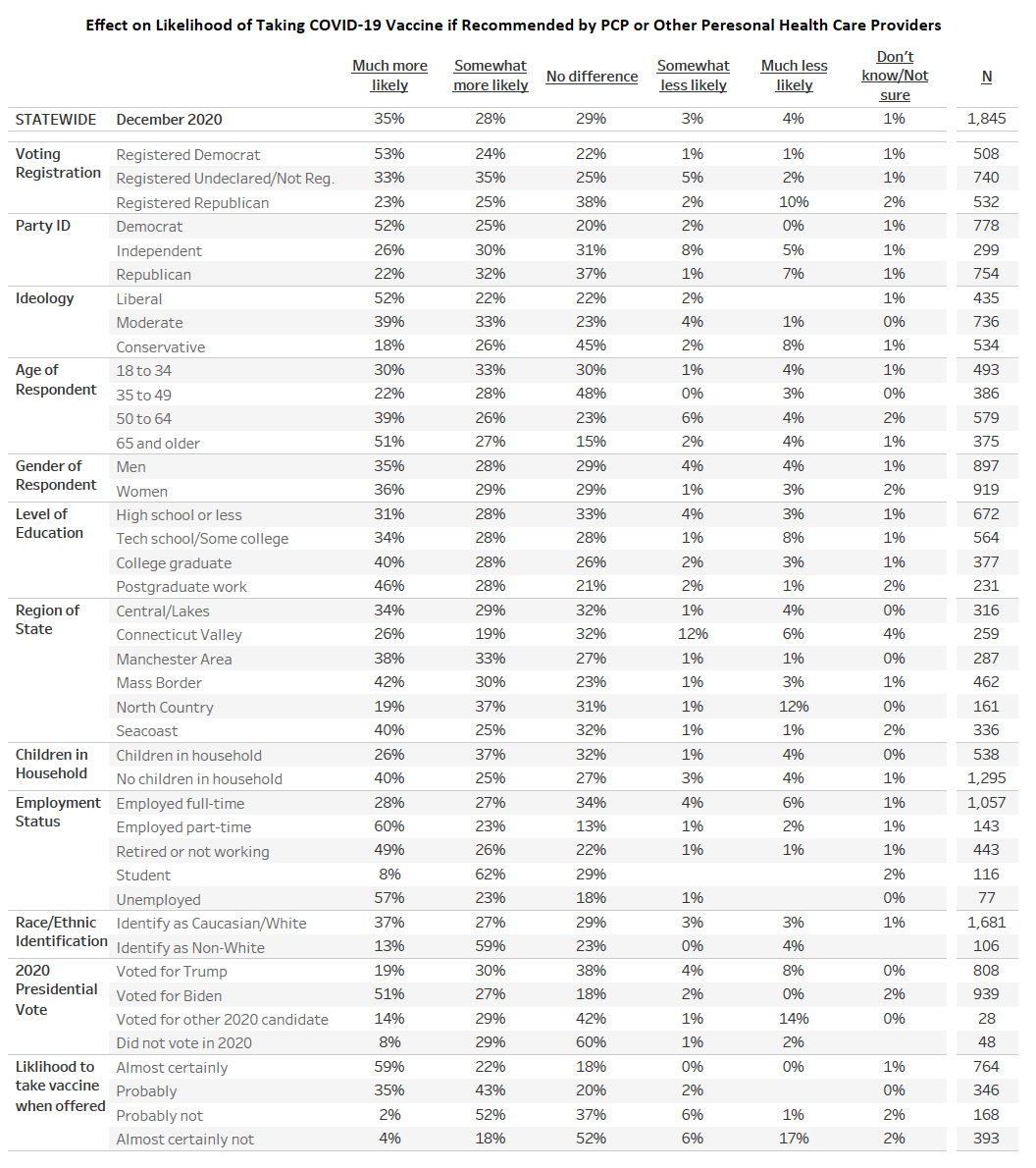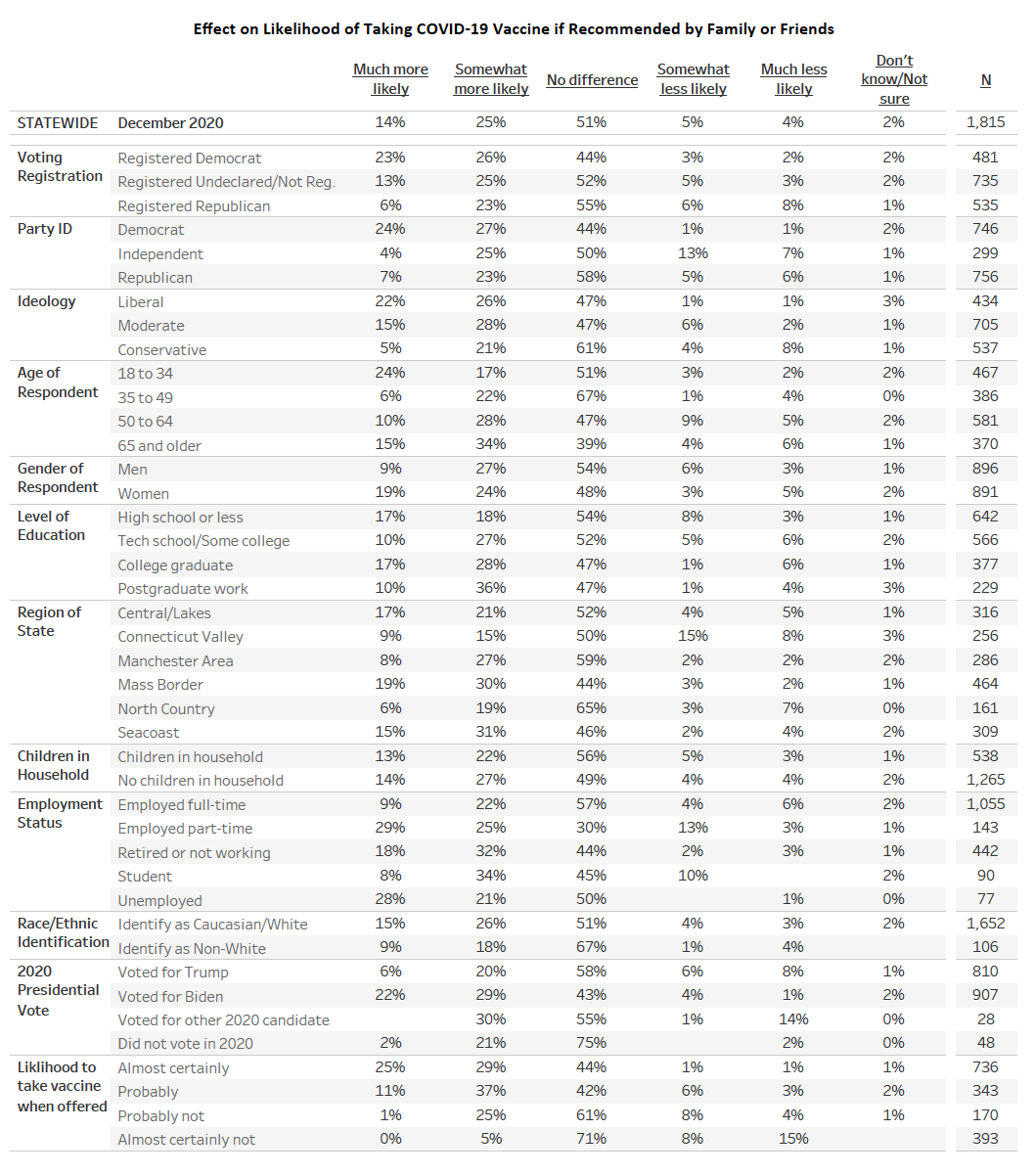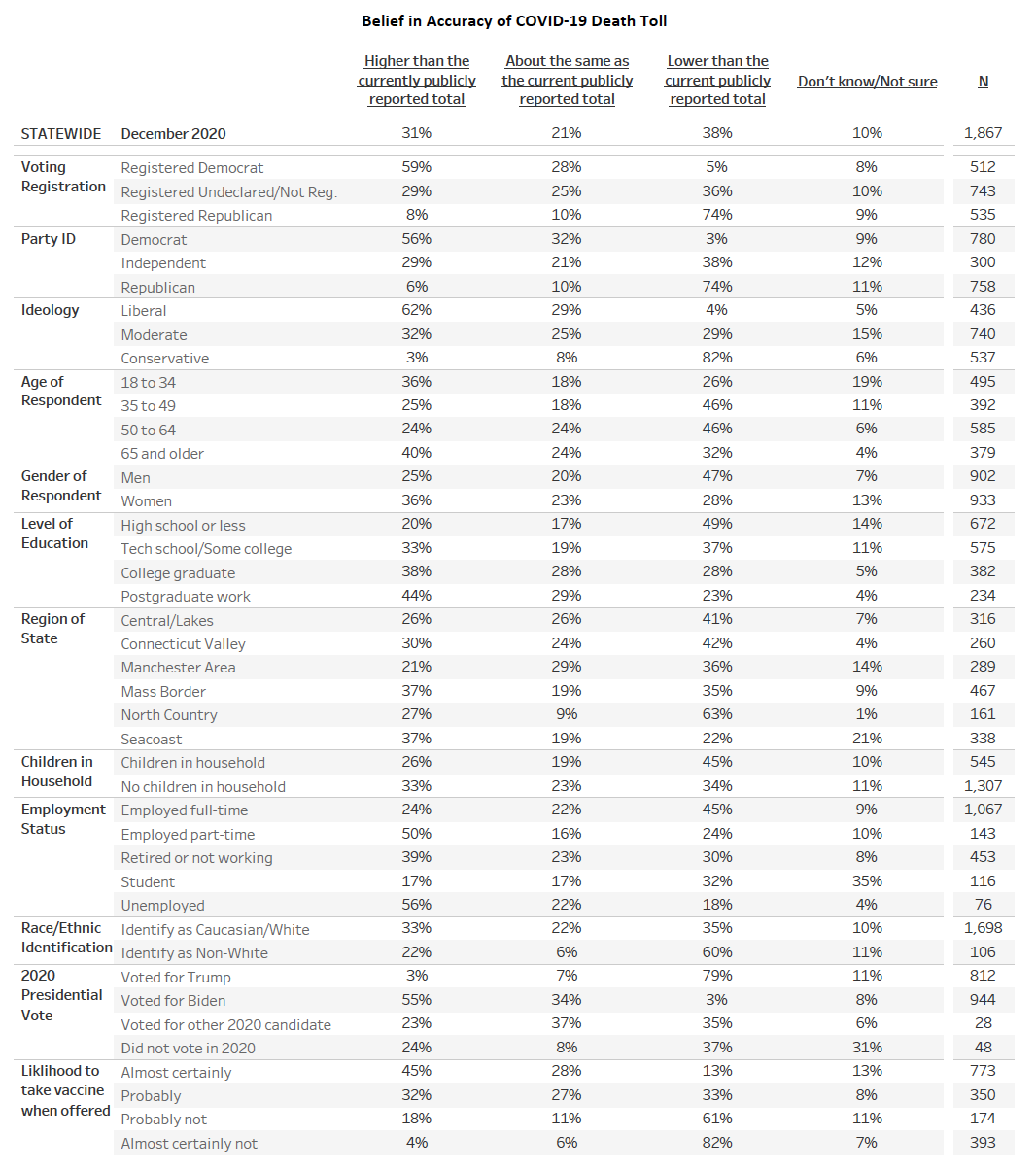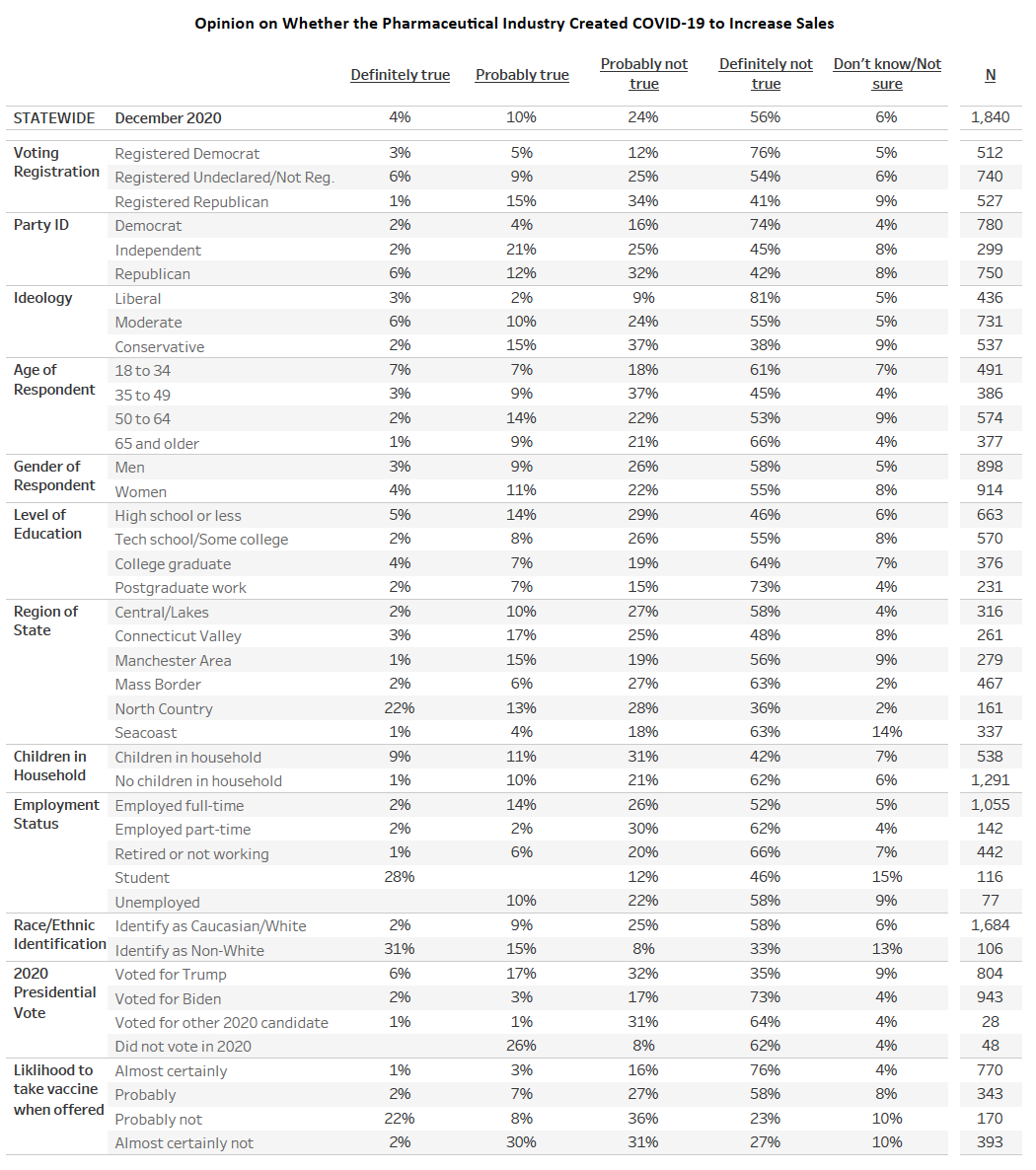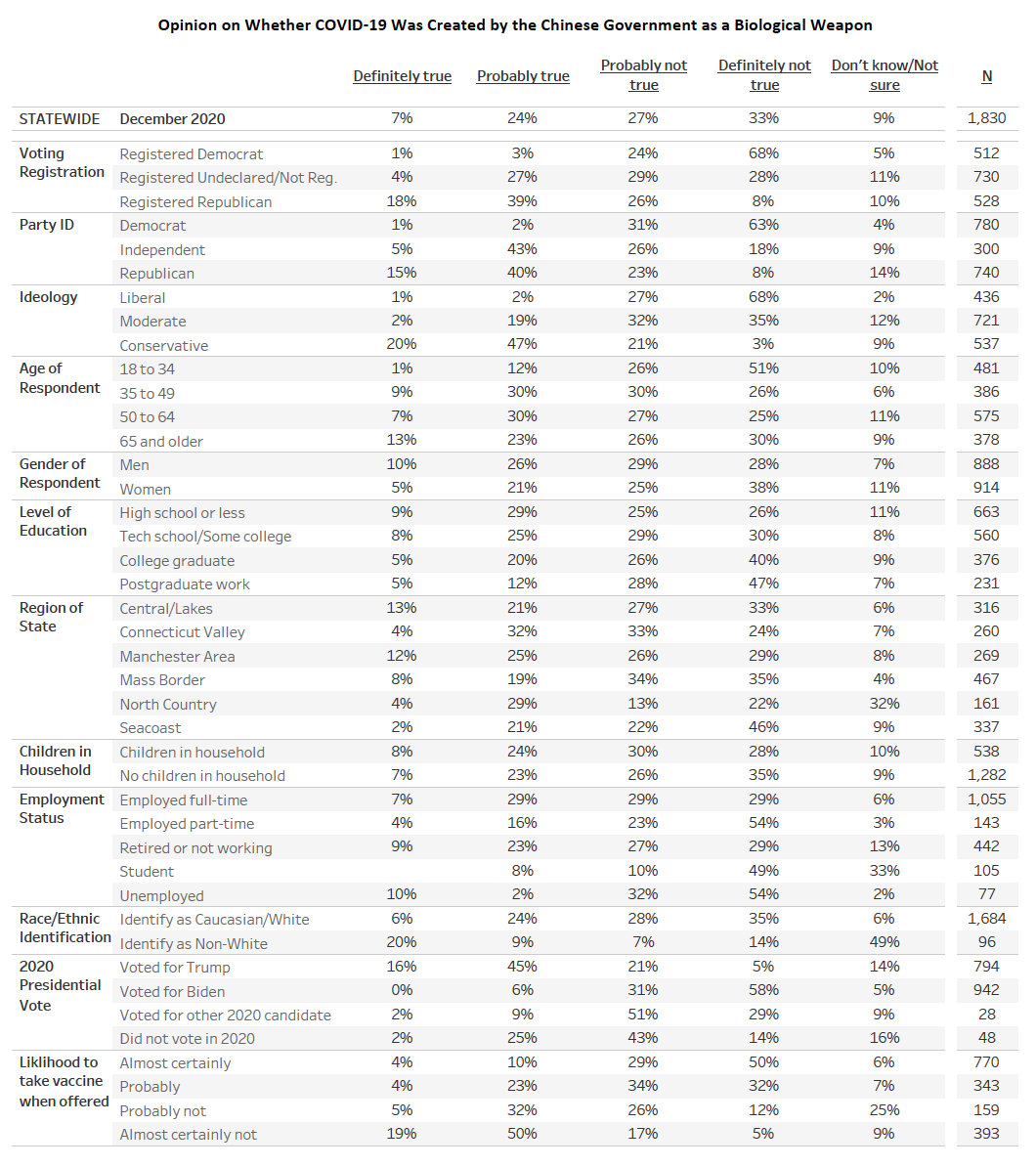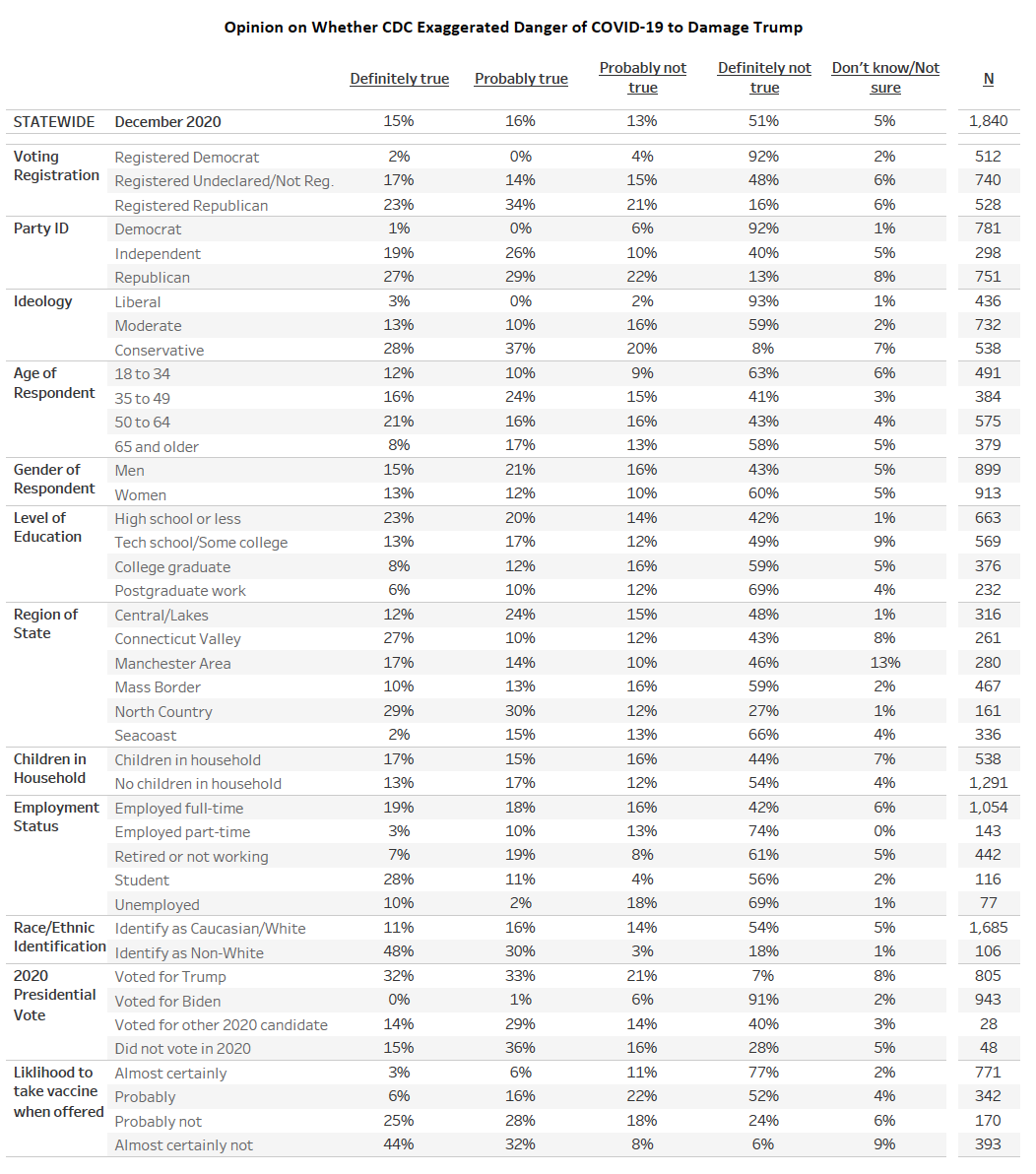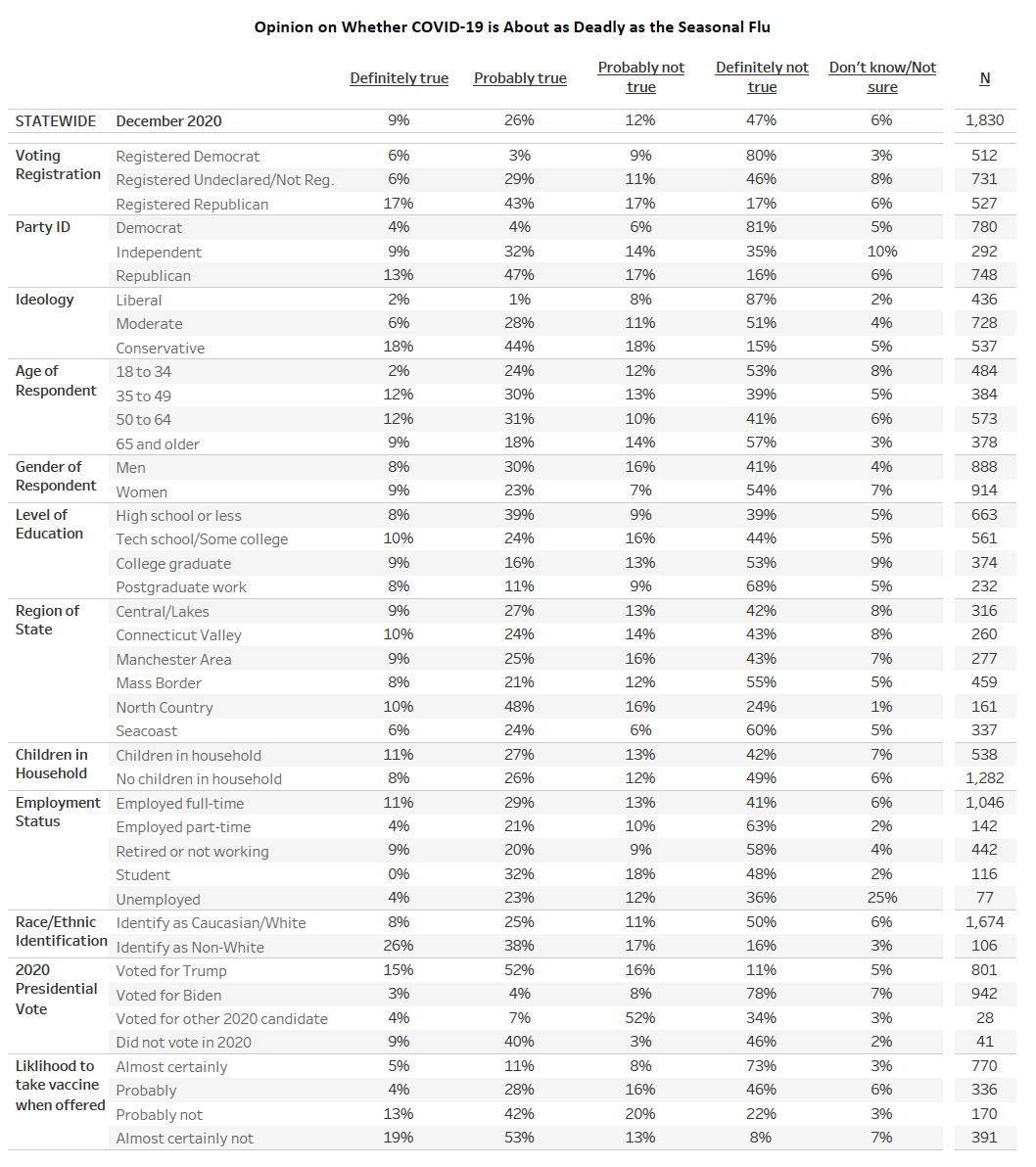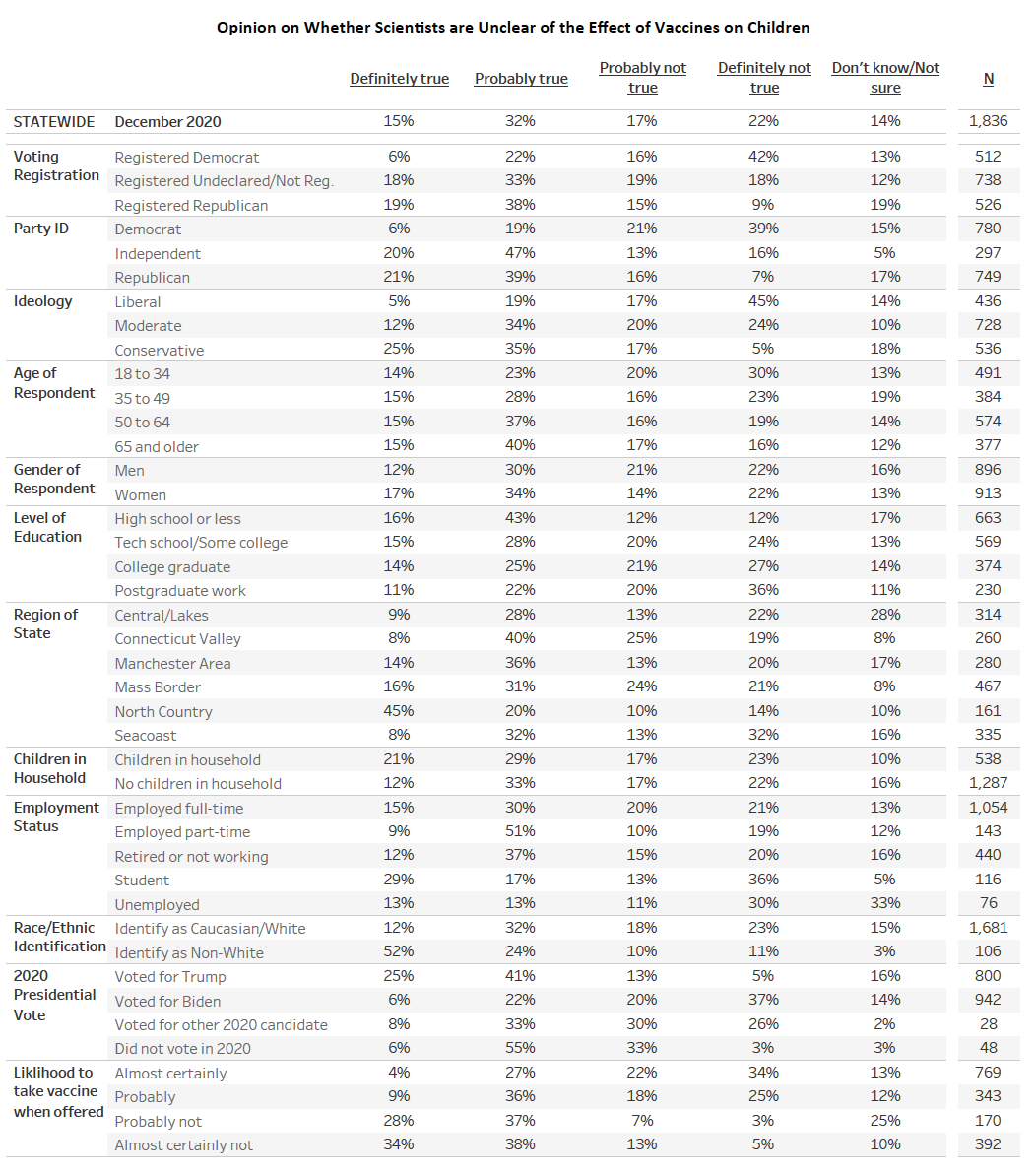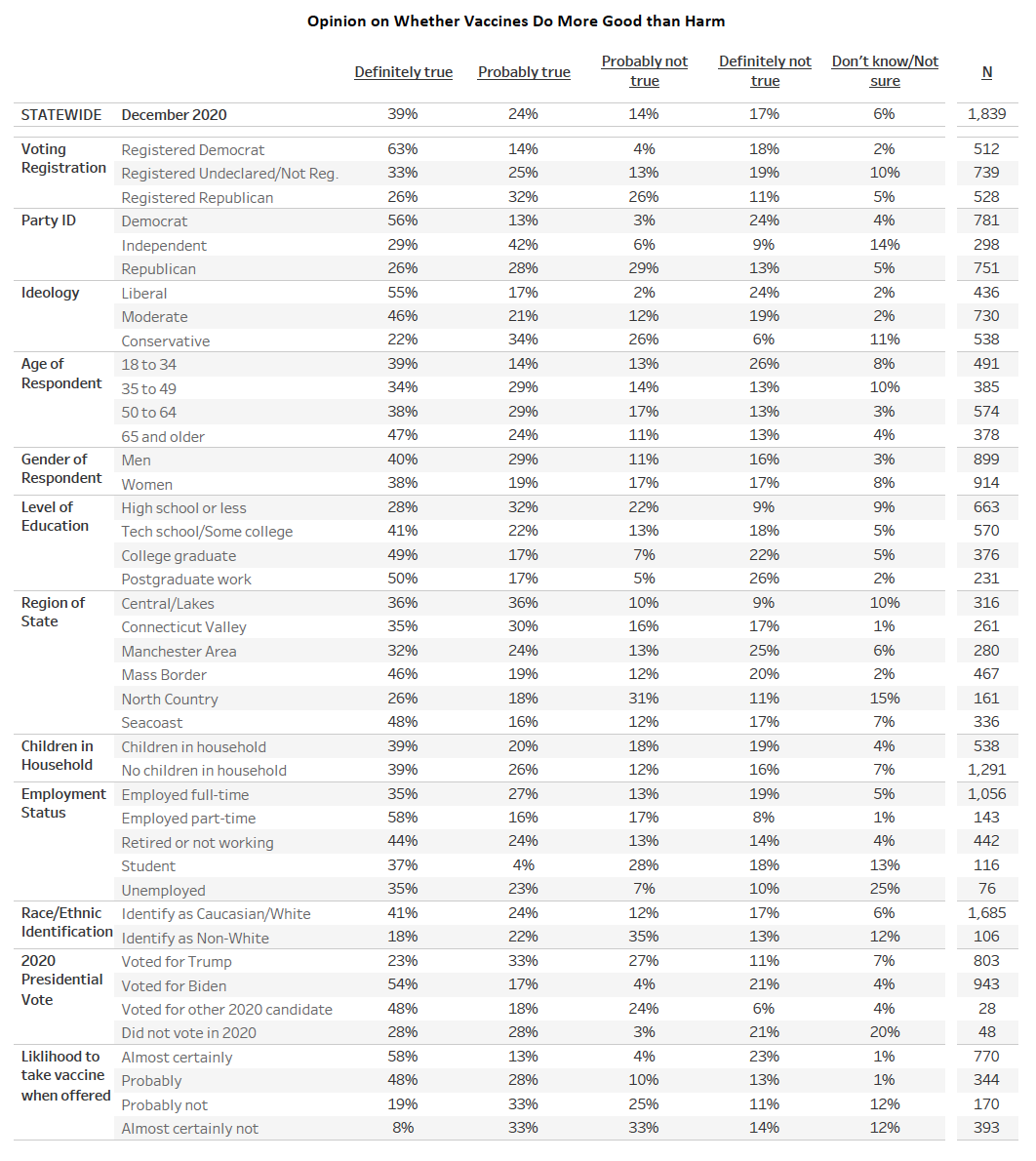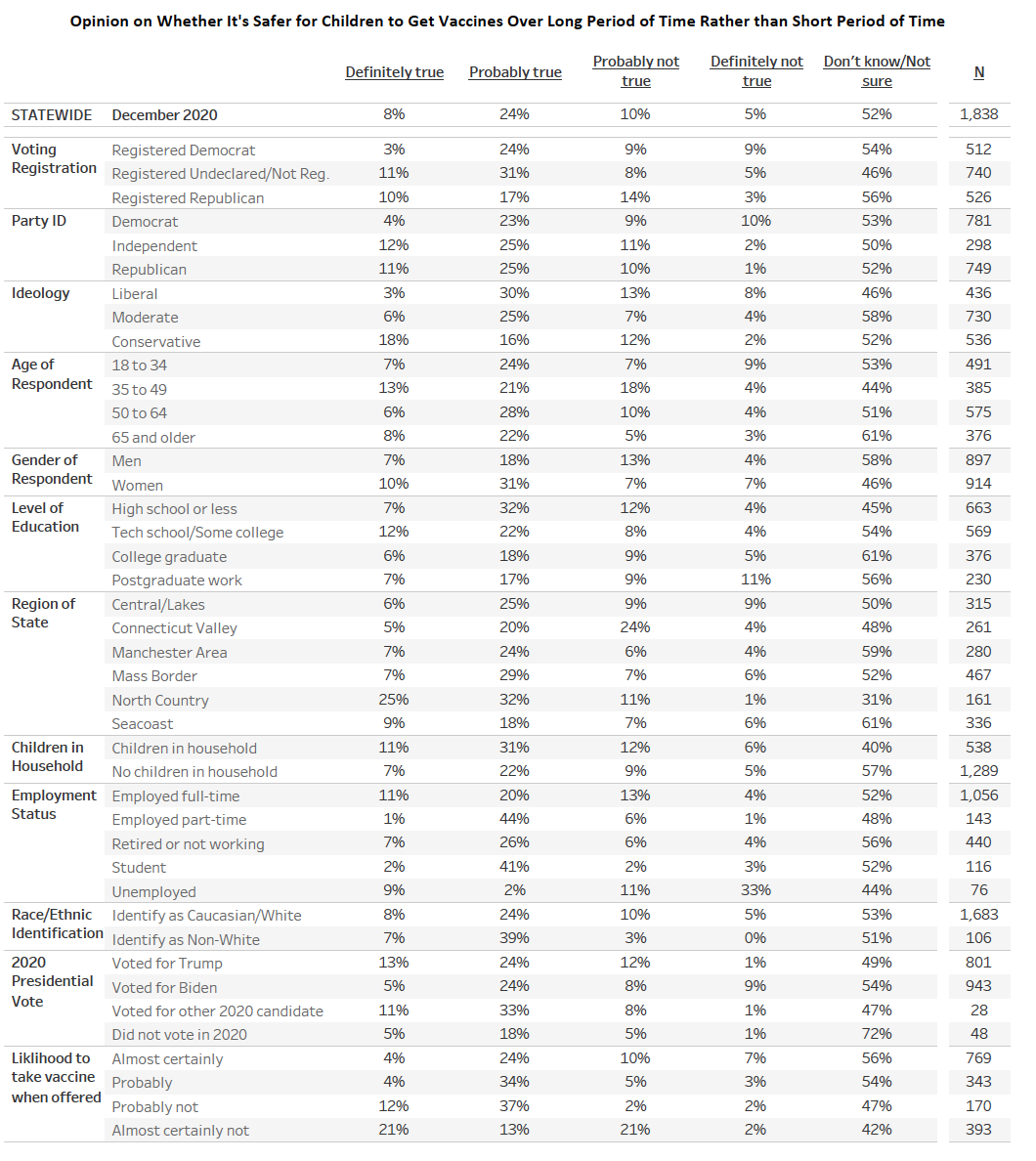
MAJORITY IN NH PLAN TO GET COVID-19 VACCINE WHEN AVAILABLE
By:
| Sean P. McKinley, M.A. | Tracy E. Kerins, Ph.D. |
| Zachary S. Azem, M.A. | Judy Rees, B.M., B.Ch, M.P.H., Ph.D. |
| Andrew E. Smith, Ph.D. |
DURHAM, NH - A majority of New Hampshire residents say they will get a COVID-19 vaccine when one is available, however, some groups remain unwilling to get a vaccine. Respondents most frequently cite their PCP, Dr. Fauci, New Hampshire epidemiologist Dr. Benjamin Chan, or their friends and family as people whose endorsement would make them more likely to get vaccinated. Those who are currently unwilling to get vaccinated say they are not likely to be convinced to do so by anyone. Republicans and Democrats disagree about the pandemic as a majority of Republicans believe the danger posed by COVID-19 is exaggerated and has been used to damage President Trump.
These findings are based on the Granite State Poll*, conducted by the University of New Hampshire Survey Center. One thousand eight hundred and seventy-four (1,874) Granite State Panel members completed the survey online between December 3and December 7, 2020. The margin of sampling error for the survey is +/- 2.3 percent. Data were weighted by respondent sex, age, education, and region of the state to targets from the most recent American Community Survey (ACS) conducted by the U.S. Census Bureau, as well as party registration levels provided by the NH Secretary of State and 2020 election results in NH. Granite State Panel members are recruited from randomly-selected landline and cell phone numbers across New Hampshire and surveys are sent periodically to panel members.
Likelihood of Getting COVID-19 Vaccine
Six in ten (61%) New Hampshire residents say they will almost certainly (42%) or probably (19%) get vaccinated when a COVID-19 vaccine is offered to them, 31% say they will probably not (10%) or almost certainly not (21%) get vaccinated when a vaccine is offered to them and 8% are unsure.
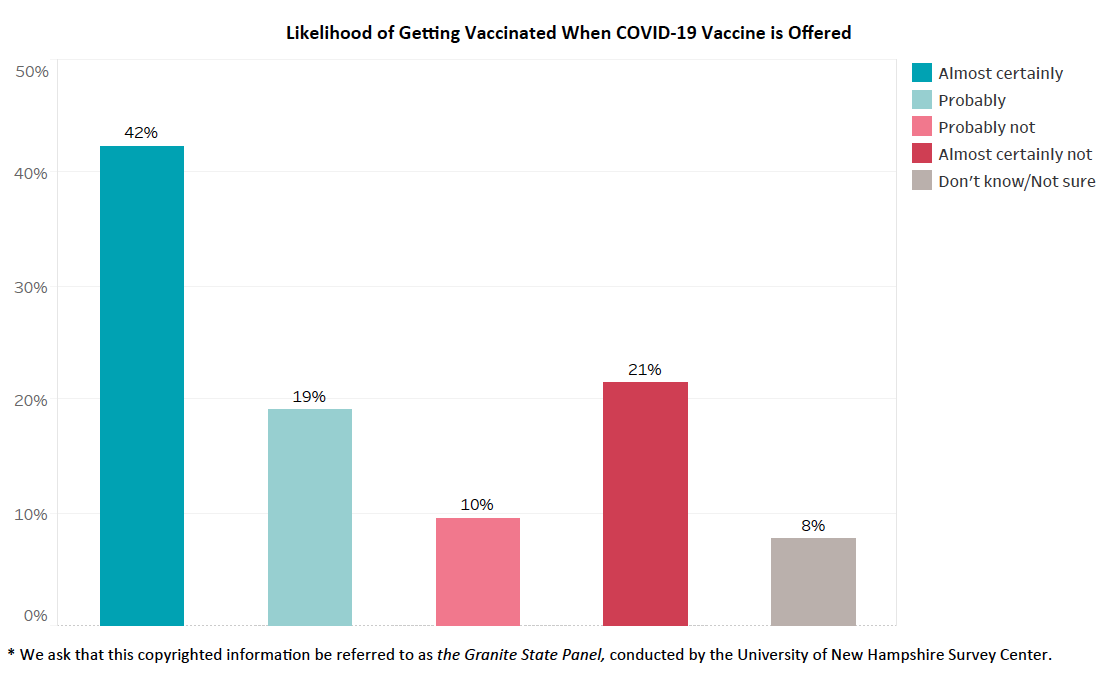
- Self-identified Democrats (85%) are significantly more likely than Independents (52%) or Republicans (41%) to say they will get vaccinated when a COVID-19 vaccine is available.
- Self-described liberals (83%) and moderates (73%) are more than twice as likely as conservatives (33%) to say they will get vaccinated when a COVID-19 vaccine is available.
- Respondents aged 65 and older (76%) are more likely than younger residents to say they will get vaccinated when a COVID-19 vaccine is available.
- Respondents who have completed postgraduate work (80%) and college graduates (72%) are more likely than others to say they will almost certainly or probably get vaccinated when a COVID-19 vaccine is available but only 48% of those with a high school degree or less feel this way.
- Seacoast (75%) and Massachusetts Border (75%) residents are more likely than other state residents to say they will get vaccinated when a COVID-19 vaccine is available. Only 35% of North Country residents feel this way.
- Higher income residents are more likely than those with lower incomes to say they will get vaccinated when a COVID-19 vaccine is available. Only 40% of those with a household income of less than $45,000 feel this way.
- There is a large racial difference in the likelihood of getting a vaccine: nearly two-thirds (65%) of White residents say they will get vaccinated when it is available but only 29% of those who identify as another race or ethnicity feel this way.
- Biden voters (84%) are more than twice as likely as Trump voters (36%) to say they will get vaccinated when it is available.
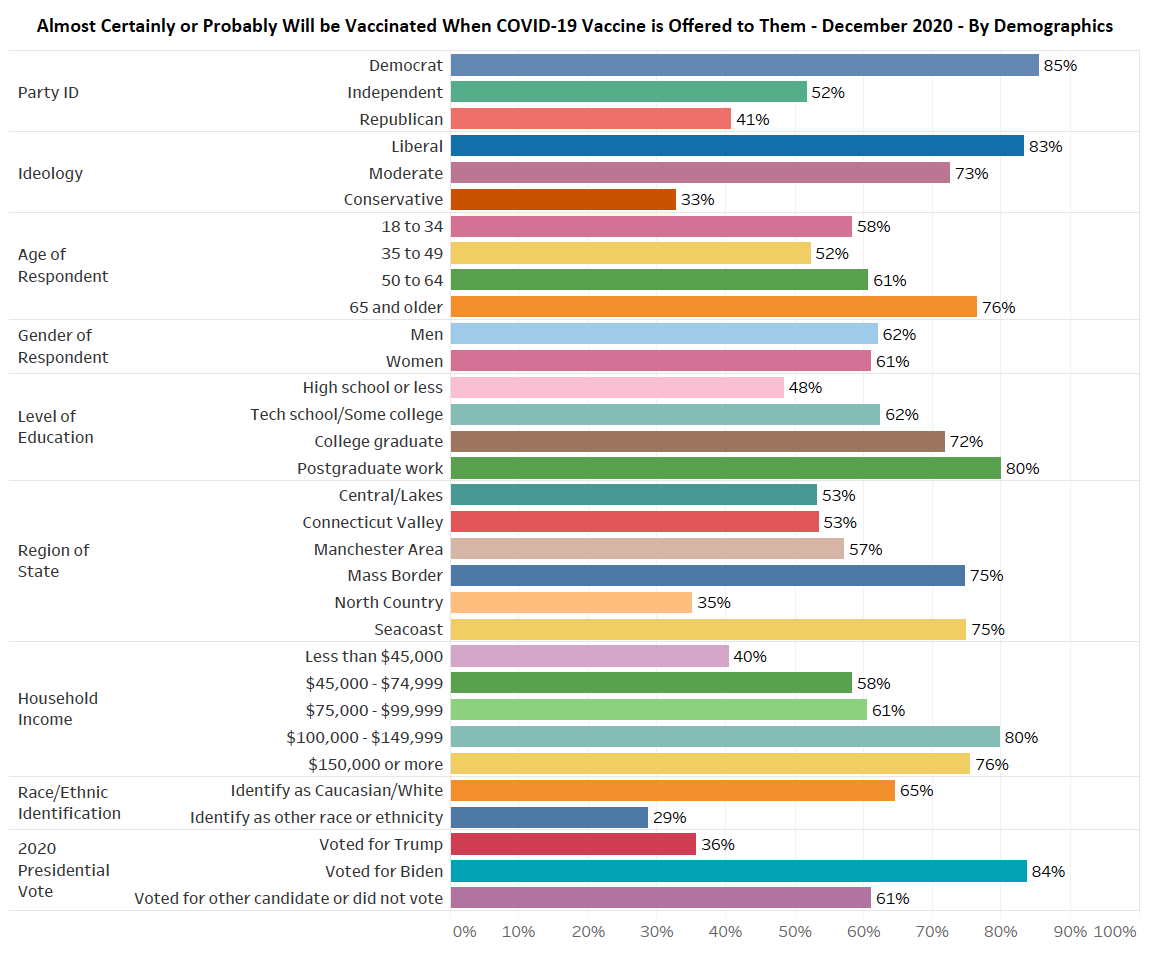
Concerns About the COVID-10 Vaccine
Sixty-two percent of New Hampshire residents say they are very (17%) or somewhat (45%) confident that when a COVID-19 vaccine is available it will stop them from getting sick with COVID-19. Three in five (59%) are very or somewhat confident that it will be safe and 58% are confident that it will have gone through an appropriate approval process. However, less than half of residents are very or somewhat confident that the vaccine will provide long-lasting protection against COVID-19 (48%) or that it will have few or minimal side effects (45%)
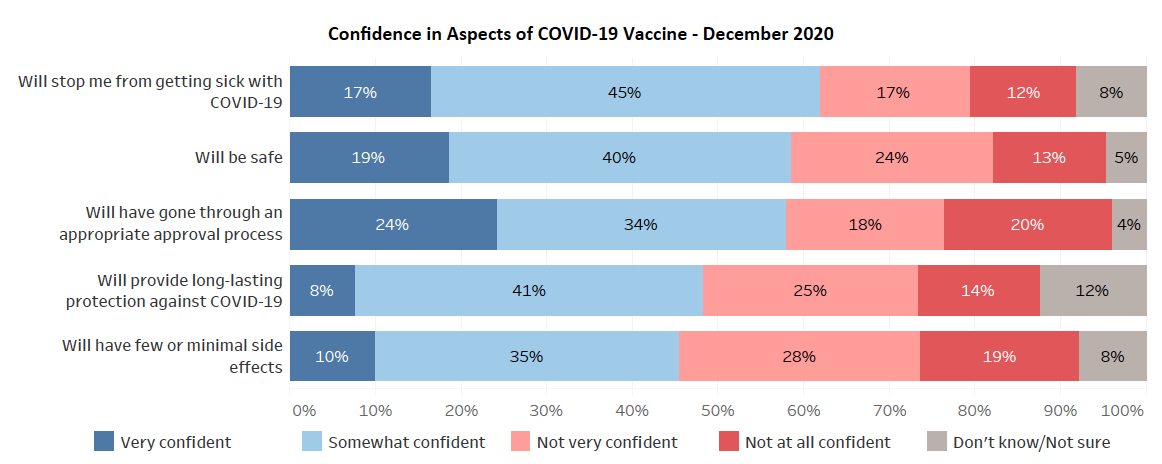
Those who are certain they will get vaccinated when a COVID-19 vaccine is available, self-identified Democrats, liberals, Biden voters, those aged 65 and older, those who have completed postgraduate work, and Seacoast residents are most likely to be confident in these aspects of the COVID-19 vaccine. Those say they will not get vaccinated when a COVID-19 vaccine is available, not-white residents, North Country and Connecticut Valley residents, Trump voters, voted for another candidate, or did not vote in 2020, lower income residents, conservatives, those with a high school education or less, self-identified Independents and Republicans, and those aged 35 to 49 are less likely to be confident in these aspects of the COVID-19 vaccine.
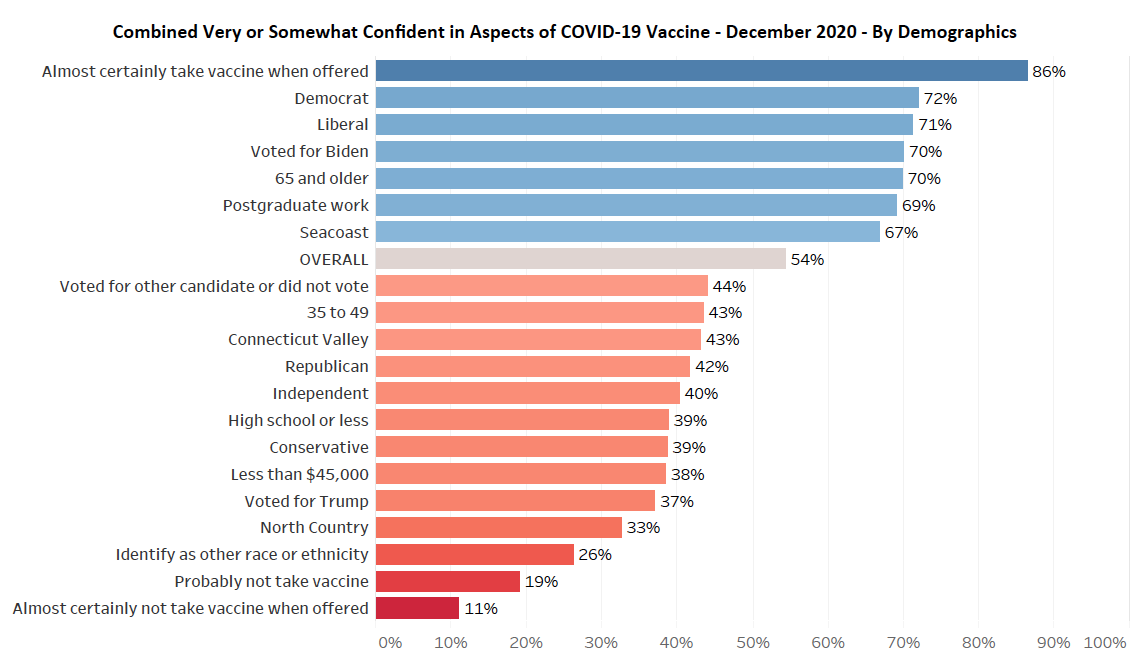
When asked what would make them more likely to get vaccinated, 63% of Granite Staters say that a recommendation from their primary care physician (PCP) or other personal health care providers would make them much more (35%) or somewhat more (28%) likely to get a COVID-19 vaccine. Federal and state public health officials are also important - 47% say a recommendation from Dr. Facuci or other national public health officials would make them more likely to take the vaccine and 40% say a recommendation from Dr. Chan or other New Hampshire public health officials would make them more likely to get vaccinated. A recommendation by President-elect Biden or his staff or by Governor Sununu or his staff are somewhat important, 30% say that a recommendation from these figures would make them more likely to get vaccinated.
However, a higher percentage of respondents say they would actually be less likely to get vaccinated than more likely to get vaccinated if the vaccine was recommended by national or state media organizations, social media, or President Trump.
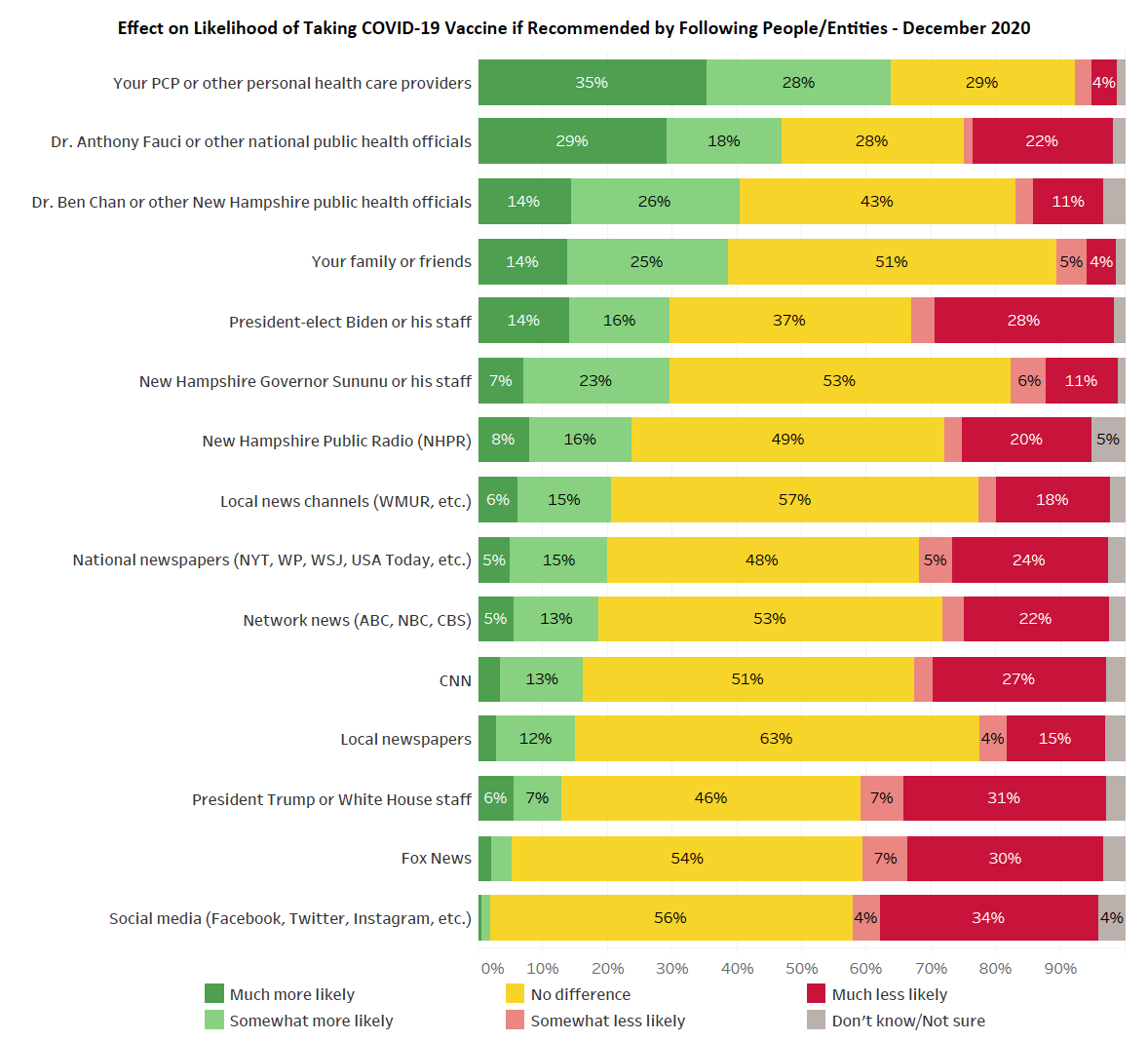
Among those who say they will likely get vaccinated (N=1,125), majorities say they would be more likely to take the vaccine if it was recommended by their PCP or other personal health care provider, Dr. Fauci, Dr. Chan, or family and friends. Few respondents who say they are unlikely to get vaccinated (N=587) are likely to be influenced by any of these people or organizations: 31% say a recommendation by their PCP or personal health care provider and 13% say a recommendation from President Trump would make them more likely to get vaccinated, but very few would be swayed by media or other public officials.
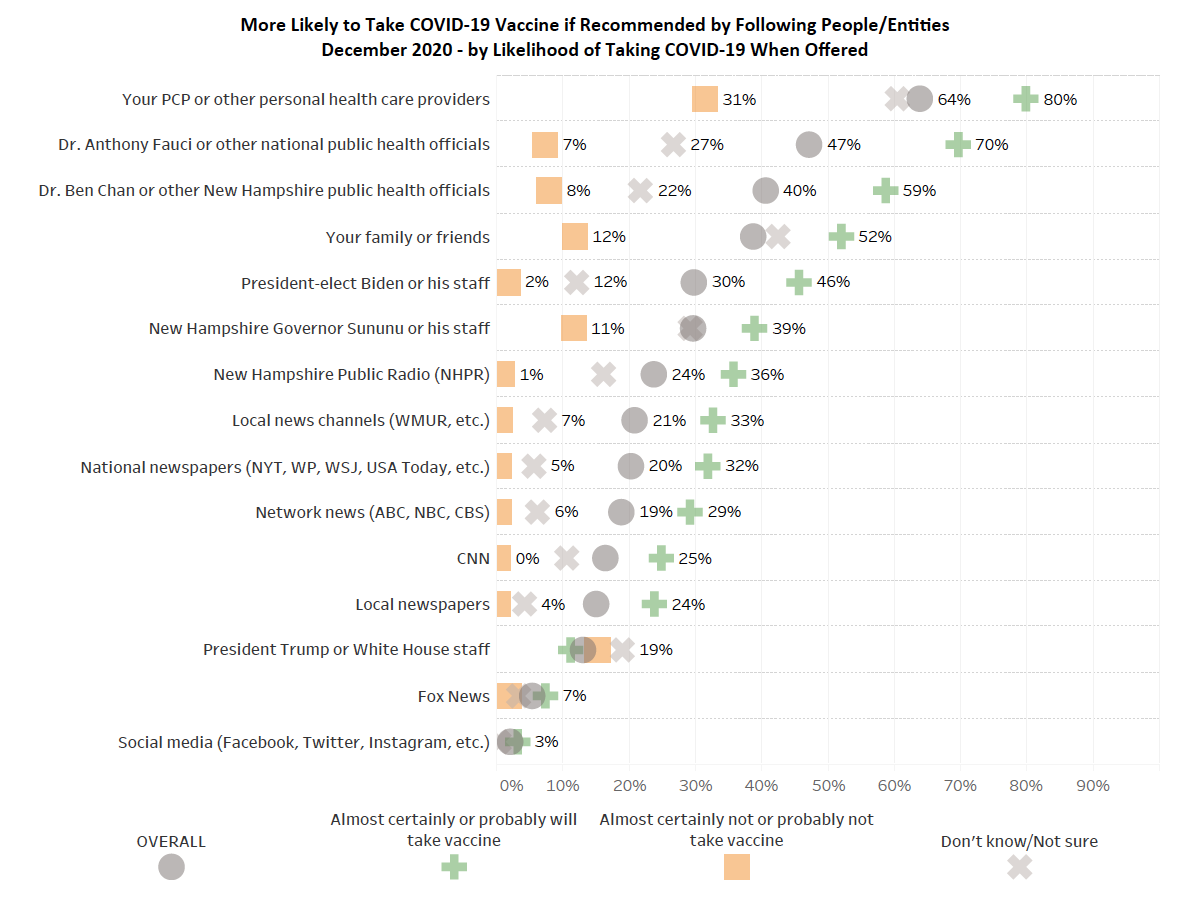
Beliefs About the COVID-19 Vaccine
There is a significant disagreement among New Hampshire residents about the accuracy of the death toll of COVID-19. When asked about the accuracy of the publicly reported death toll from COVID-19, 21% believe the death toll is about the same as the current public number, 38% believe the death toll is lower than the current publicly reported total, and 10% are unsure.

Those who are unlikely to be vaccinated, conservatives, Trump voters, self-identified Republicans, North Country residents, those who identify as a non-white race or ethnicity, those with a household income between $45,000 and $74,999, and those with a high school education or less are more likely than others to believe that the COVID-19 death toll is lower than has been publicly reported. Biden voters, self-identified Democrats, liberals, those who are likely to get vaccinated, Seacoast residents, those who have completed postgraduate work, and those aged 18 to 34 are less likely to believe this to be true.
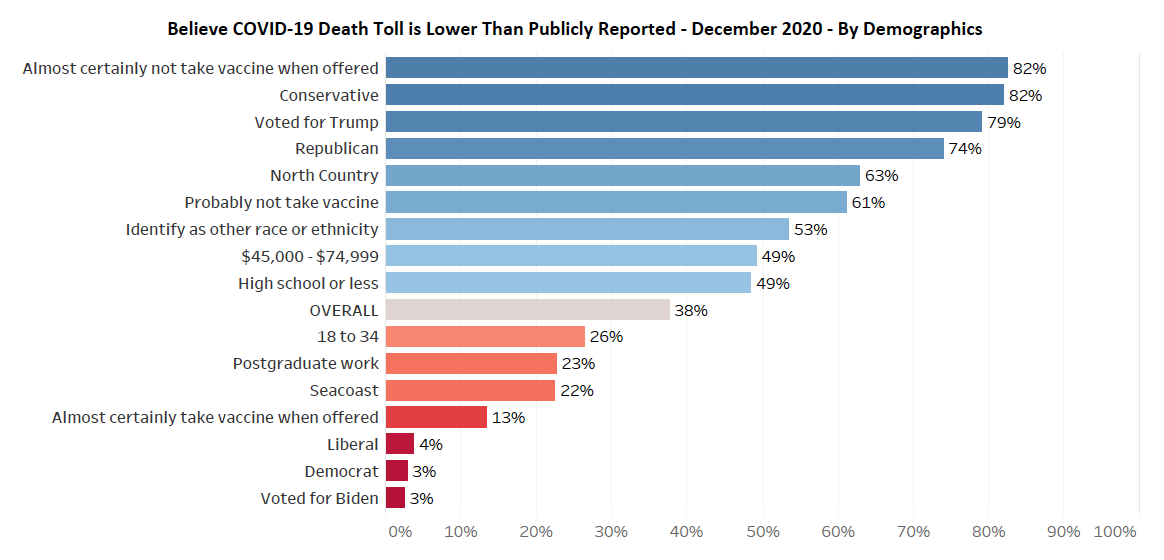
Nearly two-thirds (63%) of New Hampshire residents think it is definitely or probably true that in general, vaccines do more good than harm, 31% believe this is not true, and 6% are unsure. Residents are more divided on the effect of vaccines on children: nearly half (46%) think it is definitely or probably true that in general, scientists are still not clear what effect vaccines can have on children while 39% believe this is not true. Most residents (52%) are unsure whether it is safer for children to get their vaccines over a long period of time rather than a short period of time.
Residents are less likely to believe that several claims about COVID-19 are true. Thirty-five percent believe it is definitely or probably true that COVID-19 is about as deadly as the seasonal flu, 31% believe it is definitely or probably true that COVID-19 was created by the Chinese government as a biological weapon, 31% believe it is definitely or probably true that the U.S. CDC exaggerated the danger posed by COVID-19 to damage the Trump presidency, and 14% believe it is definitely or probably true that the pharmaceutical industry created COVID-19 to increase sales of its drugs and vaccines.
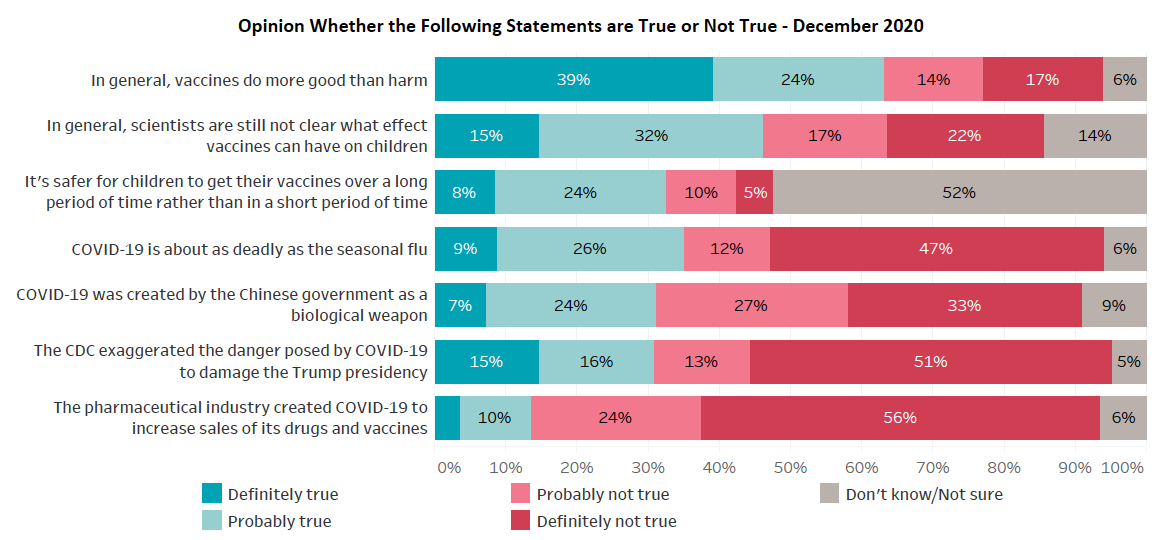
Opinions about these statements are strongly impacted by partisanship. More than half of Republicans believe that COVID-19 is about as deadly as the seasonal flu, that COVID-19 was created by the Chinese government as a biological weapon, and that the CDC exaggerated the danger posed by COVID-19 to damage the Trump presidency, while less than 10% of Democrats agree with any of these statements. Democrats and Republicans are slightly more likely to agree that in general, vaccines do more good than harm but disagree intensely on whether in general, scientists are still not clear what effect vaccines can have on children.
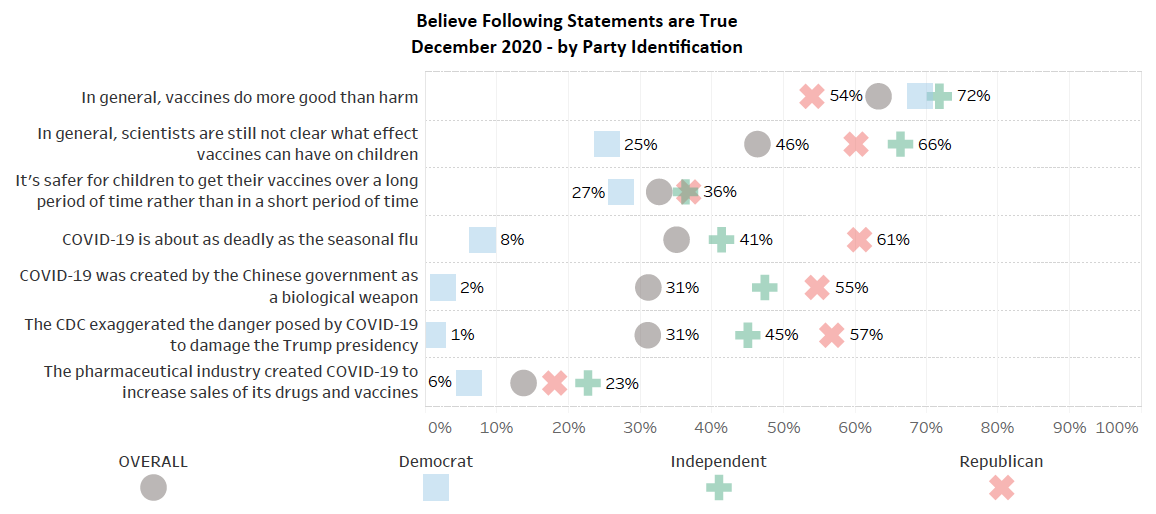
Granite State Poll Methodology
These findings are based on the latest Granite State Poll, conducted by the University of New Hampshire Survey Center. One thousand eight hundred and seventy-four (1,874) Granite State Panel members completed the survey online between December 3 and December 7, 2020. The margin of sampling error for the survey is +/- 2.3 percent. These MSE's have not been adjusted for design effect. The response rate for this survey is 36%. The design effect for the survey is 2.5%.
Data were weighted by respondent sex, age, education, and region of the state to targets from the most recent American Community Survey (ACS) conducted by the U.S. Census Bureau, as well as party registration levels provided by the NH Secretary of State and to 2020 election results in New Hampshire.
The Granite State Panel is part of an effort by the University of New Hampshire Survey Center to investigate new ways of gathering and understanding the opinion of New Hampshire residents. Approximately 5,750 New Hampshire adults were recruited from randomly selected landline and cell phone numbers to participate in the panel. Panelists are then asked to participate in online surveys sponsored by the UNH Survey Center.
The number of respondents in each demographic below may not equal the number reported in cross-tabulation tables as some respondents choose not to answer some questions. Due to rounding, percentages may not sum to 100%.
For more information about the methodology used in the Granite State Panel, contact Dr. Andrew Smith at (603) 862-2226 or by email at andrew.smith@unh.edu.
